




By Sam Robinson SENIOR REPORTER
By Ebony JJ Curry SENIOR REPORTER
Late Thursday night, Sept.
The city of Detroit Elections Department is about halfway through mailing out absentee ballots to eligible voters signed up for the state’s permanent mailing list.
About 45,000 ballots have been mailed out as of Wednesday, Daniel Baxter, chief operations officer of the elections department, told the Michigan Chronicle. There were around 97,000 voters who had previously requested to receive an absentee ballot for each election.
By Ebony JJ Curry
SENIOR REPORTER
14, a historic moment unfolded in American labor relations as the United Auto Workers (UAW) union initiated a strike against Ford, General Motors (GM), and Stellantis. For the first time, the union took simultaneous action against all three major Detroit-based automakers. The action involves approximately 13,000 UAW members in assembly plants across Michigan, Ohio, and Missouri, who walked off their jobs after existing labor contracts expired at 11:59 p.m.
A constitutional amendment approved by voters in 2022 gave registered voters the ability to be included in a permanent absentee voter list. These voters automatically receive an absentee ballot for all future elections without needing to apply each time.
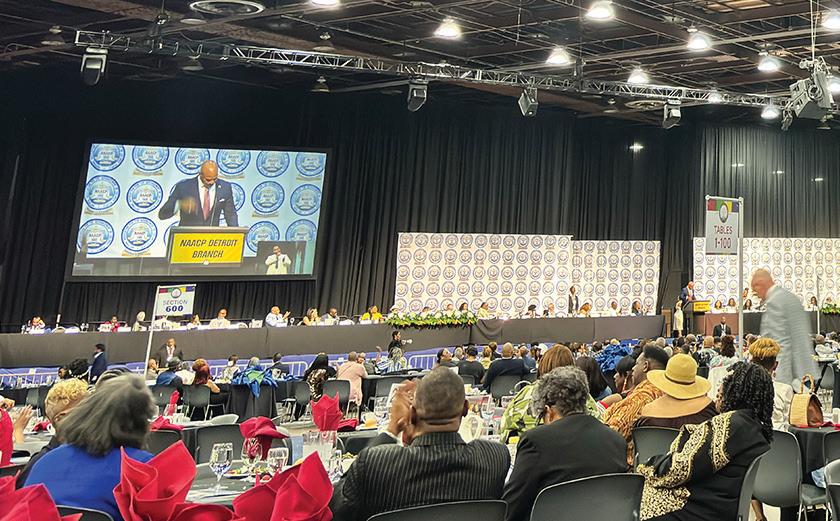
IThe city is mailing more absentee ballots than people who have voted in previous primary elections, but that doesn’t mean it will see a greater turnout.
n a breathtaking celebration of talent, determination, and the unyielding spirit of Black excellence, the Michigan Chronicle marked its 10th Annual 40 Under 40 event Thursday evening. This year’s soirée, drenched in the theme “All Black Everything with Gold Accents,” transcended expectations and essentially illuminated the golden gems within the true essence of Black excellence. Hosted by the charismatic duo of Andre Ash and Lynzee Mychael from Michigan Chronicle’s Finally Friday, the night was a triumph for the city of Detroit and its vibrant community of young Black professionals.
Baxter said the department is predicting a 13-18% turnout for the August 5 primary election, or about 65,00090,000 voters. Detroit has around 500,000 registered voters.
“The election will be won by absentee,” Baxter told Michigan Chronicle on Wednesday.
This fall, Detroiters will elect its first new mayor since 2013, new City Council members occupying redistricted districts, the city clerk, and a new Board of Police Commissioners.
Shortly before midnight on Sept. 14, GM released a statement expressing disappointment with the strike action, despite offering what it termed an “unprecedented economic package” that included historic wage increases. Stellantis also expressed disappointment in a statement, saying the company immediately went into contingency mode to protect its operations.
As the night unfolded, we had the privilege of honoring other outstanding individuals, each carving their own path to success. Clement “Fame” Brown, the creative mind behind Three Thirteen Detroit’s Brand Name, received the prestigious Entrepreneur of the Year Award. Brown’s commitment to empowering the city through fashion and entrepreneurship has left an indelible mark.
By Ebony JJ Curry SENIOR REPORTER
The evening sparkled with a golden promise as we celebrated remarkable individuals from various walks of life. Among the honorees were the brilliant and visionary co-founders of Detroit Hives, Nicole Lindsey and Timothy Paul Jackson. Their work has not only changed the landscape of beekeeping and urban farming in Detroit but also exemplified the transformative impact Black professionals can have on their communities.
By Ebony JJ Curry SENIOR REPORTER
“I have only just a minute. Only sixty seconds in it. Forced upon me, can’t refuse it. Didn’t seek it, didn’t choose it. But it’s up to me to use it. I must suffer if I lose it. Give account if I abuse it. Just a tiny little minute, but eternity is in it.”
“Entrepreneur of the year – that’s a big deal,” said Brown. “It’s always an honor to be honored and it’s always a blessing to be in a room full of so many talented, accomplished, and popular people that look like me. I’m geeked. I started making and selling clothes as a kid and I always knew that I would have a business, but I never knew it would be Detroit’s brand name business, so I take a lot of pride in the fact that our business represents our city’s pride.”
munities harmed by systemic neglect and bad policy.
Taking home the Corporate Excellence Award was Dannis Mitchell, Director of Community Engagement at Barton Malow.
ness district that had been the lifeblood of the community.
“Together we have created a social, environmental, and financial impact through bees,” said Jackson. Lindsey followed that sentiment with, “It is through our local partnerships and collaborative efforts that we exist in over 28 plus locations managing the health of 4.5 million honeybees – humbly speaking our movement has inspired others locally, nationally, and even internationally to take on similar missions.”
Decisions these officials make will have a major impact on the day-to-day lives of Detroiters. These positions determine how elections are administered, the individuals who make up city government, its budget, and the legislation that is passed.
You can request an absentee ballot online, by mail, or via Dropbox by 5 pm on Friday, August 1. Requests can also be made in person at the Clerk’s Office by 4 pm on Monday, August 4, 2025.
Detroit Hives, a pioneering organization founded by Lindsey and Jackson, harnesses the power of urban beekeeping to revitalize neighborhoods in the Motor City. Their initiative not only addresses critical issues like environmental conservation but also provides valuable education and employment opportunities to Black De-
The UAW has branded the industrial action as the “Stand-Up Strike,” focusing on specific plants within each automaker. UAW President Shawn Fain stated, “This strategy will keep the companies guessing. It will give our national negotiators maximum leverage and flexibility in bargaining. And if we need to go all out, we will. Everything is on the table.” Union leaders have also indicated that additional plants could be targeted in future waves if negotiations remain stalled.
For many Detroiters, Interstate 375, or I-375, has long been just another stretch of urban highway, a concrete artery connecting different parts of the city. To some, it’s a mere convenience; to others, it’s an unremarkable part of their daily commute. However, there’s a deeper, far more troubling story beneath the surface of this seemingly ordinary freeway—a story of pain, displacement, and the lasting impact on Black Detroiters.
Governor Wes Moore recited those words from Dr. Benjamin E. Mays as he stood before the crowd at Detroit’s 70th Annual Fight For Freedom Fund Dinner. His voice carried the urgency of a leader who knows change doesn’t happen by hoping or waiting. Moore called on every person in that room to use their minute, to act now, to do the work needed to bend policy, culture, and power toward justice.
“It is so important to recognize that there are young leaders across the country, many that are born here in Detroit. I represent our city nationally and I tell people, ‘Yea I’m a D-girl I’m from the west-side of Detroit,’” Mitchell expressed. “But more importantly, I’ve been able to have experiences within an industry that not many of us, specifically women of color, have the opportunity to engage in and I’ve been the youngest person in the room, the only Black person in the room, and the only Sistah in the room, and I really had to articulate the importance of showing up, giving chances when others won’t, and being persistent.” As a trailblazing Black woman thriving in a predominantly male-dominated industry, her unwavering commitment to fortifying the connections between businesses and Detroit’s communities is unde-
“I come from a family that’s not used to writing the laws but one that is used to the consequences of them,” Moore said. He connected Detroit’s history—urban renewal that bulldozed Black neighborhoods, redlining that drained generational wealth, the scars left by the construction of I-375—to a larger national legacy of inequality born from deliberate policy choices. “Inequality is a policy choice. Just as bad policies have gotten us into this, better policies must lead us out. The work of repairing must address bad systems,” Moore told the crowd.
By Andre Ash
DIGITAL ANCHOR
It’s a history marred by pain, injustice, and economic devastation. More than 130,000 residents, primarily Black, were forcibly displaced. Families were uprooted, generational wealth was obliterated, and a thriving community was torn asunder. The wounds inflicted by I-375 run deep, transcending the physical barrier of a freeway to penetrate the very soul of Black Detroiters.
A string of shootings in Greektown in mid-April left both visitors and residents of this bustling downtown destination in awe. One of these shootings tragically claimed the life of a popular and beloved security guard following a dispute with a patron.
towards mending the wounds inflicted on Black Detroiters and restoring a sense of belonging that was so callously torn away in the past.
Alice G. Thompson received the Ida B. Wells Freedom and Justice Award for decades of work supporting Detroit’s children and families through BFDI Educational Services, Inc. Courtney Smith, founder of the Detroit Phoenix Center, and Yousef Almadrahi of Specialty Medical Center Inc. were honored with the Great Expectations Award for their work supporting youth facing homelessness, trauma, and health disparities.
The I-375 Boulevard Project is about more than just correcting historical injustices; it’s about redefining the future. It will connect downtown Detroit to surrounding neighborhoods, bridging the gap that was placed upon the city decades ago.
Voters who are newly registering or updating their registration should request and complete their ballot in person at the clerk’s office by 8 pm on Election Day, August 5. The general election is November 4.
This painful legacy can be traced back to the nation’s interstate highway program of 1956—a program that aimed to connect the country but often did so at the expense of marginalized communities. In the case of I-375, it meant carving a path through the heart of Black Detroit, reinforcing segregation, and perpetuating inequality.
Moore said racism is not just an act committed by individuals—it is a system. “Wisdom is knowing when patience is a virtue and when patience is a detriment,” he said. He told the room this is not a season for waiting. “This is not the season of no and slow, this is the season of yes and now,” he said.
Rev. Anthony underscored the meaning of the night. “Our Keynote Speaker and Awardees are befitting of being a part of the lineup for our 70th Annual Fight For Freedom Fund Dinner,” he said. “Everyone must get in this battle to preserve freedoms that we have fought for over 200 years to maintain. This is why we want to remind everyone according to our theme, ‘The Power Is Within The People.’”
The male suspect allegedly shot the guard before fleeing the scene, while his female companion is accused of concealing the weapon in her bra.
By Andre Ash DIGITAL ANCHOR
The deadline to register for the primary election online is July 21. The online registration deadline for the November 4 general election is October 21.
You can register on the state of Michigan’s website here: mvic.sos. state.mi.us/Home/Index.
The tale begins in what is now Lafayette Park, once known as Black Bottom—a neighborhood rooted in African-American culture and history. Named after its dark, fertile soil, Black Bottom flourished during the mid1900s, nurturing the dreams and aspirations of prominent Detroiters like Coleman Young, Joe Louis, and numerous other Detroit legends. But in the name of urban renewal in the 1950s, this vibrant neighborhood was systematically dismantled, erased from the map, and replaced by a lifeless stretch of asphalt.
Held June 29 at Huntington Place, the dinner gathered Detroit’s elders, young leaders, and freedom fighters under one roof to honor the past, confront the present, and chart a path forward. Rev. Dr. Wendell Anthony didn’t waste time naming the stakes. “This is a most critical time in our nation’s history,” he said. “We all stand at the crossroads of whether we will go forward as Americans together or fall victims to anarchy and demagoguery at the highest levels individually.”
A Holistic Approach to Providing Shelter and Support for Detroit’s Unhoused People
He spoke of the fight for representation, the power of collective will. During his first run, Moore polled at only 1%. More people said they wouldn’t vote at all than pledged support for him. Yet he rose, earning more votes than any gubernatorial candidate in Maryland history. “These moments are fleeting but the impact is everlasting,” he said.
These incidents unfolded during an unseasonably warm spring, leading to increased pedestrian traffic and heightened tensions in the densely populated downtown area.
For one to aptly recognize the harm caused by such projects, it is vital to note that some of the planners and politicians behind those projects built them directly through the heart of vibrant, populated communities—oftentimes to reinforce segregation and sometimes as part of a direct effort to replace or eliminate Black neighborhoods.
Today, the resurgence of Paradise Valley stands as a testament to the indomitable spirit of Black Detroiters and the enduring legacy of Black excellence. This historic district, once a vibrant hub for Black businesses and culture, is experiencing a renaissance that harkens back to its glory days. The destruction of Black Bottom may have torn apart a thriving community, but the resolute determination of a new generation of entrepreneurs and visionaries is reclaiming that lost legacy.
The surge in crime and the influx of visitors to Detroit’s downtown core garnered the attention of the Detroit Police Department (DPD), catching them somewhat off guard.
That theme rang through every detail. Attendees turning 70 in 2025 were recognized, a nod to those who held the line in Detroit’s long fight for justice. Youth artists ages 14 to 25 were invited to submit legacy table sign designs. Young dancers were invited to perform. The Detroit Branch made clear the struggle belongs to every generation and that culture—art, music, movement—remains a foundation of organizing.
The winners of Detroit’s upcoming elections will likely win or lose their races with more than 80% of voters sitting out, which elections officials say is abysmal.
Fain clarified the union’s strategy: “I want to give a major shoutout to the thousands of members who are on the picket lines right now fighting for all of us. The Stand-Up Strike is a new approach to striking. Instead of striking all plants at once, select locals will be called on to stand up and walk out on strike. This is our generation’s answer to the movement that built our union – the sit-down strikes of 1937. We told the Big 3 that Sept. 14 was the deadline and we meant it. We gave the companies our economic demands eight weeks ago and it took more than a month to get to the table.”
A Detroit Free Press analysis of voter turnout over the decades revealed
The union is pushing for a comprehensive list of demands. This
Homelessness continues to plague urban communities, with families and individuals grappling with the challenges of making ends meet in today’s economic climate. Whether it’s struggling to meet monthly mortgage payments or coping with soaring rental costs in a housing market marked by shockingly high prices, a variety of factors contribute to the growing issue of people becoming unhoused.
While the residential areas bore the brunt of this demolition, the heart of Black Bottom, its thriving business center, remained largely untouched. Restaurants, theaters, clubs, and bars—the very places that brought Detroit’s Black community together—were concentrated around Hastings Street, the epicenter of African-American culture in the city.
Meagan DunnJulie Schneider
Then, in a cruel twist of fate, Hastings Street, too, was obliterated a few years later, making way for the construction of I-375. This marked the final blow, sealing the fate of Black Bottom and signaling the beginning of the end for Paradise Valley, the Black busi-
Moore, Maryland’s first Black governor and only the third in U.S. history, brought data and truth to the podium. He reminded Detroit why policy is where the fight lives. Maryland now has the lowest unemployment rate in the country. His administration invested $1.3 billion in Maryland’s HBCUs. He granted 175,000 clemencies for cannabis convictions, delivered $80 million in state contracts to Black-owned businesses, and launched ‘Just Communities’ on Juneteenth from the birthplace of Harriet Tubman and Frederick Douglass. That initiative moves $400 million into 419 com-
Historically, shelters have provided a temporary respite for those in need, often serving as the first or second option after exhausting alternatives like staying with friends or family. Shelters offer a place to rest one’s head and a warm meal, albeit sometimes for extended periods. For others, being unhoused means living in cars or makeshift outdoor
Housing Resource Helpline in response to the challenges that residents face in navigating the complex system of housing services. The helpline provides a single point of contact for people seeking housing assistance and connects them with the resources they need.
That call echoed through a night full of Detroit’s best. Roland Martin accepted the William Monroe Trotter Freedom and Justice Award, promising the crowd, “We gone fight til hell freezes off and when it does we’re gonna fight on the ice.”
But now, after decades of enduring the scars of I-375, there is a glimmer of hope on the horizon. Plans have been unveiled to transform this once-divisive freeway into a vision that seeks to right the wrongs of the past while heralding a new era of inclusivity and community revitalization.
Rev. Dr. Jeremiah Wright Jr. received the James Weldon Johnson Lifetime Achievement Award. Despite two strokes, Wright came down from Chicago to join the night. His decades of ministry and commitment to Black liberation remained steady, a moral compass for those still fighting.
Support for the helpline comes from the Gilbert Family Foundation, which has pledged $10 million over three years to fund the program. Wayne Metro Community Action Agency manages the helpline, making it accessible to all Detroit residents. This initiative simplifies access to the City’s various housing services, ensuring that residents in need can easily find assistance.
James White, Chief of Police for the Detroit Police Department, said: “We were caught somewhat flat-footed right out the gate. By design we went into the spring deployment, which is less than the mid-summer deployment, and saw we say an uptick in violence that first warm weekend.”
Chief White attributes the violence in Greektown to a combination of weather conditions and a surge in population.
Fueled by more than $100 million from the Infrastructure Investment and Jobs Act and other partners, this ambitious project aims to create jobs, remove barriers to economic growth, and reconnect the neighborhood with the rest of Detroit. It is a step
In the heart of Paradise Valley, Blackowned businesses are not just flourishing but thriving, offering diverse services, products, and experiences that pay homage to the past while paving the way for a prosperous future. From jazz clubs to soul food restaurants, the Black Press, and art galleries to fashion boutiques, this revival is breathing life into the very essence of what once made this neighborhood a vibrant cultural epicenter. It’s a resurgence that extends beyond brick and mortar; it represents the resurgence of a spirit that refuses to be subdued.
Moore pointed out Detroit’s history of urban redlining, urban renewal, and community displacement, linking it to policy choices that demand reversal. “We cannot understand the history of Detroit without urban redlining. Without understanding the creation of I-375 and the communities that it destroys,” Moore said.
He explained, “ We saw numbers downtown that we have not seen, ever. People are emerging from COVID and there’s a feeling that we’re in a post-COVID era… and with the venues downtown and the reasons to come down with all the activities that are going on, we saw hundreds of more people and, in particularly, young folks, teenagers that we hadn’t seen.”
The dinner offered no illusions of an easy victory. Every speaker, every honoree named the truth: delay is where the devil
Detroit City Councilman Fred Durhal III, representing District 7, where Eastern Market resides, told the Michigan Chronicle, “It’s still very early in the process, MDOT is
Responding swiftly to the surge in violence, DPD adjusted its deployment plans. Rather than waiting for mid-summer, they deployed officers in the spring itself
By Ebony JJ Curry SENIOR REPORTER
By Lynzee Mychael MULTIMEDIA JOURNALIST
The causes of homelessness are as diverse and complex as the individuals experiencing it. In response, the City of Detroit has adopted a holistic approach to combat this issue.

“Providing services and high-quality housing to persons at risk of or who are experiencing homelessness is a key priority of the City of Detroit, said Julie Schneider, Director of Detroit’s Housing and Revitalization Department.
“The city and its partners offer a lot of great services to help Detroiters with their housing needs, but they don’t mean much if people don’t know how to access them,” said Mayor Mike Duggan. “Thanks to the efforts of our partners and the generous support of the Gilbert Family Foundation, we now have a simple process to guide residents to the right housing resource and a growing number of programs to help them.”
What a Federal Government Shutdown Could Mean for Detroiters?
“This means focusing on building the pipeline of supportive housing and coordinating with the Continuum of Care on the delivery of critical resources such as emergency shelter, rapid rehousing, and diversion and prevention programs. It also means preserving and expanding affordable housing options for Detroiters of all incomes and improving housing stability though comprehensive service offerings available through the Detroit Housing Resource HelpLine and Detroit Housing Services Division within HRD.”
Michigan Lawmakers Push Tenant Empowerment Bills to Address Unsafe Rental Conditions
Of all the questions facing Detroit’s next mayor, perhaps the most urgent one is: who has the courage and clarity to transform the city’s promise into progress for the people who’ve never left? That was the charge quietly carried into the Harmonie Club Thursday evening, where the Power 50 Mayoral Candidate Forum took shape—not as a debate, but as a serious dialogue hosted by the Michigan Chronicle and curated by the ‘Brunch for 10,’ officially named ‘A Small Group of Local Leaders,’ a powerful cohort of Black civic leaders including;
■ Dennis Archer Jr., CEO, Ignition Media Group
In May 2023, the City of Detroit launched the Detroit

The Gilbert Family Foundation’s broader commitment involves pledging $500 million to support projects across Detroit over the next ten years, with housing initiatives being a significant part of their contribution.
Notably, Detroit has witnessed a consistent decrease in recent years, with the number of unhoused residents steadi ly declining. In 2019, approximately 7,847 people were unhoused and entered the City’s community response system. In 2021, about 5,687 people experienced homelessness.
■ Denise Brooks-Williams, Executive Vice President & Chief Operating Officer, Henry Ford Health ■ Ronald E. Hall, President & CEO, Bridgewater Interiors ■ Dr. Darienne Hudson
According to the City of Detroit, since the start of the fiscal year 2019 to 2021, Detroit saw a 28% decrease in the

From the days of the Great Migration when thousands of Black families flocked to Detroit in search of jobs and a better life, to the pivotal role they played in the city’s cultural and musical heritage, Black Detroiters have left an indelible mark on the city. However, in recent years, Detroit has experienced significant gentrification, which has raised concerns about the displacement of long-standing Black residents. Similar to a setting sun, there’s a rising spirit, and Black Detroiters are reclaiming their place in the city, despite the challenges posed by gentrification. During the Great Migration, thousands of Black families from the South came to Detroit in search of jobs in the booming automobile industry. Despite facing discrimination and segregation, they built vibrant communities on the city’s east and west sides. Over time, these neighborhoods became
Christopher Jackson, Principal, Queen Lillian Development ■ Hiram E. Jackson, CEO, Real Times Media ■ LaTrice McClendon
the rights of all women are continued.
paring for this moment since the results of the 2016 election were final. We recently filed a law suit to stop the 1931 law from going into effect, and we’ve also asked the state courts to affirm that the Michigan constitu tion does already contain a right to abortion. Our advocacy arm, Planned Parenthood Advocates of Michigan, is a founding member of the coalition that launched Reproduc tive Freedom for All, a ballot initiative to affirm the right to abortion and reproductive freedom in the state constitution,” said Vasquez Giroux.
will rule in the upcoming sion, advocates on both sides of the argument are willing to continue their
“Overturning Roe v. Wade would be a terrible break with nearly 50 years of judicial precedent and – more importantly – a blow against individual freedom. It is my hope ings of this draft. If that is not the case, we need to ity Leader Schumer and Gov. Whitmer in support of their efforts to preserve tive freedom,” said Chair Alisha Bell, on behalf of
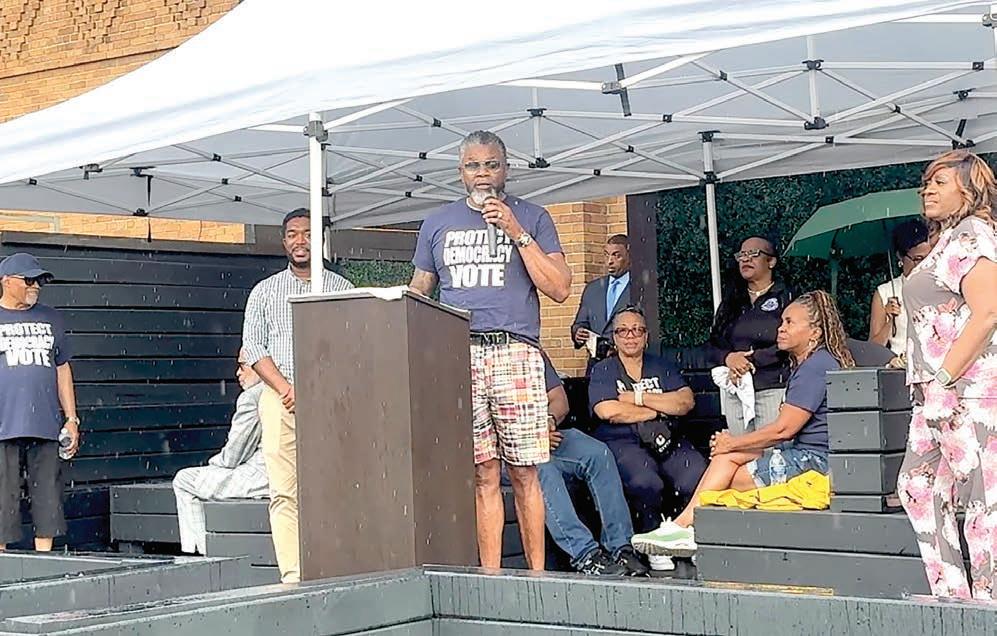





“The bottom line is that we will do everything in our power to keep abortion legal in Michigan, and if SCOTUS makes that impossible, we will do everything we can to ensure our patients can access the care they need.”
less than 30% of voting-age residents had participated in citywide elections since 2005, when 41% of voting-age residents participated in the general election, which saw former Mayor Kwame Kilpatrick. 235,558 Detroiters cast ballots to reelect Kilpatrick three years before he stepped down amid a public corruption scandal.
corporate boards to have more diverse representation and pass the legislation.
women to choose a less safe route restoring ‘back alley’ and illegal abortion practices, including self-abortions. Moreover, African American women and women of color, who already have a long-storied history with access and inclusion in medi-
Press analysis found.
There were about 70,000 voters who participated in the 2021 primary election and more than 92,000 residents who cast votes during that year’s general election.
islature adopts it.
The amount of residents who have participated in elections since then has been cut in half. About 50% of voting-age residents participate in presidential elections, and about 37% vote in gubernatorial elections, the Free
Better collection and analysis of criminal justice data: BLAC recommends data collection and professional analysis be initiated with the assistance of our Attorney General, Michigan Commission on Law Enforcement Standards (MCOLES), Association of Michigan Prosecutors and other stakeholders to collaborate, collect and analyze data strategically.
pro-choice versus prolife, the fight for reproductive choice is one of freedom. As Michigan officials work to ensure each woman who finds herself in the position to choose has access to care without the threat of legal action, many wonder
and elected officials approved changes in their city charters to move city elections to a presidential election year. Many local elections are held on dates other than national or statewide elections.
It’s not just Detroit.
Increase school funding: Statutory changes to increase the School Aid Fund revenue by at least $3.6 billion and establish a permanent weighted funding formula based on student and community needs and universal preschool (0-3).
Low voter turnout is the norm during mayoral elections in the nation’s largest cities. Among the nation’s 30 largest cities, only 20 percent of voting-age citizens cast ballots. In many cities, fewer than 15 percent of eligible citizens vote in local elections, according to research by Oregon State Professor Emeritus Phil Keasling.
The health committee recommends reviewing state licensure policies to address the barriers that Black psychologists face in obtaining licensure in Michigan.
But don’t call it an “off-year” election, Detroit Clerk Janice Winfrey told Michigan Chronicle Wednesday during an event for candidates for those vying for city council, the mayor, and board of police commissioners.
Winfrey said she takes seriously the city’s effort to get voters to the polls with mobile vans and billboard reminders.
From page A-1
Ban no-knock warrants: Urging the House Government Operations Committee to hold hearings on HB 5013 and other legislation that would ban or limit the use of noknock or quick knock warrants, and urging the state legislature to pass meaningful reform and advise Gov. Whitmer to sign the bill after the leg-
Reject censorship in history instruction: Encouraging Gov. Whitmer to ensure the goal for Michigan schools should be history instruction that is presented by professionals with the subject matter expertise, pedagogical skills, and judgment necessary to present complex information to students that are grounded in provable facts and add to the understanding of modern-day America.
Keasling points to cities like Los Angeles or Baltimore, where residents
Ensure equitable distribution of state health funds: Ensure all Michigan communities with a significant Black population receive adequate funds to address mental health issues.
Several organizations are offering free rides to the polls for the general election.
statistics in the city have gone down, 39% of Detroiters still label crime as their biggest concern. He posed the question to each candidate: ‘How will you turn around the perception of Detroit being a safe city?’
lives. Power doesn’t shift on its own. Detroit’s legacy as a home of freedom fighters isn’t just about history—it is about what comes next.
Moore closed with scripture. “Behold I am doing a new thing. Now it springs forth do you not receive it. I will make a way in the wilderness and the desert,” he said.
The 70th Annual Fight For Freedom Fund Dinner wasn’t a celebration for its own sake. It was a gathering of witnesses and builders, voices and hands ready to craft a different future.
candidly and uninterrupted, offering deeper insight into their leadership vision, track record, and readiness. It created space for real accountability—and in a city as politically textured as Detroit, that space matters. Nicole Sherard-Freeman opened the evening by grounding the moment in its statewide implications. “Detroit is the largest city in Michigan. So goes Detroit, so goes the state,” she said, making clear this wasn’t just about one race. It was about policy, and leadership that resonates far beyond the riverfront. The Harmonie Club, donated for the evening by Roger Bashasiim, brought historical significance to the moment. And with Enomah providing food and Dennis Archer holding each candidate to the clock and to the truth, it was clear from the start—this wasn’t politics as usual.
the chancellor embraces.
“I think of transformational leadership as a thoughtful approach that causes people to change but also causes the systems and circumstances they are operating in to change too,” Ivory said.
Protecting Black voting rights: Urge state officials to remain vigilant in the fight against schemes to disenfranchise Michiganders of color.
Public safety and education were front and center. “We have to invest in prevention. Ensuring that young people have safe spaces, having more things to do and more educational opportunities,” she said, emphasizing the role of city government as a stronger partner with both public and charter schools. “I will be a champion of education here in Detroit,” she declared.
Increase mental health supports for the Black community: Recommending Michigan set a goal of increasing the number of Black mental health service providers by 20% each year over five years.
Council President Mary Sheffield led the lineup. When asked why she’s running instead of keeping her Council seat, she said, “I’m running because there’s much more work to be done in Detroit. I see the potential of our city. I love Detroit and want to move Detroit forward in a positive direction.” On fiscal health, she emphasized the need to reimagine how Detroit grows its revenue. “Downtown is thriving, but how do we capitalize off of that activity to bring more revenue throughout the city of Detroit?”
“BLAC members have worked hard to identify the needs of the Black community and we feel these recommendations will provide a solid first step towards breaking down barriers in education, community safety, health and business,” said BLAC Co-Chair Dr. Donna L. Bell.
Saunteel Jenkins, former Council President and nonprofit executive, followed with a clear message: this moment demands someone who has governed from both sides. “There are a lot of challenges that the next mayor will face. I am the only candidate that has over a decade of local legislative experience as well as over a decade of experience as a CEO.” She proposed hiring a Chief Growth Officer and emphasized targeted support for small businesses, particularly Black-owned firms, to scale. “Grow small businesses and Black businesses so that they can grow as well.”
“Transformational change doesn’t just ask people to do certain things; it asks them to change their view of what’s possible and excites them to drive that change together because they believe that what they’re doing will create positive change for everyone. That’s how entire systems change because people believe that they need to for themselves and others to live better lives.”
She addressed the critique that she’s “anti-business” by pointing to her work holding developers accountable. “Look at my record as it relates to business. I do press for more because council is the legislative body of our city. I wanted to see more joint ventures. Because of that, we now have a co-development agreement. It’s now being co-developed by a Detroit-based business.” Her focus remained on equity, ensuring that neighborhood development isn’t treated as an afterthought. She also made a clear argument for centering homeownership in the city’s housing policy. “We will continue to build affordable housing as well, but I am looking for this to be a city of homeownership.” Archer pointed out that although crime
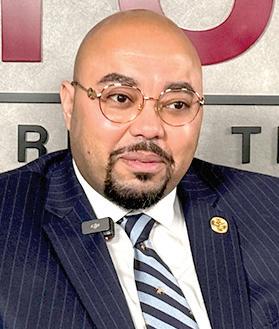
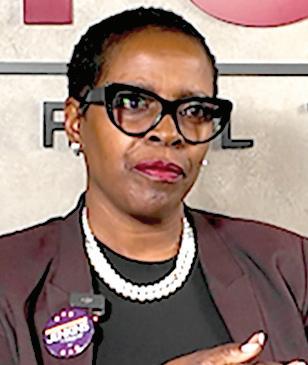
“Chancellor Ivery is a true transformational leader and an outstanding CEO, who is more than worthy of the CEO of the Year Award he just received, “ said Prof. James C. Mays, who teaches entrepreneurship and supply chain management at WCCCD’s Corporate College. “In his 27 years at WCCCD, Dr. Ivery has elevated WCCCD to become nationally recognized for excellence and innovation and preparing our students professionally and personally to do great things in the world.”
BLAC will hold a virtual town hall meeting to discuss its policy recommendations on Thursday, May 12 at 4 p.m. Join BLAC and a virtual audience in discussing the recommendations to support the Black community.
Jenkins’ hallmark proposal was the implementation of strategic master plans tailored to each of Detroit’s seven districts. “In order to build a thriving community, there must be a master plan for each of the seven districts.” When asked what she’d keep or change from the current administration, she praised the finance department’s structure and the police department’s mental health units but made clear that “Day one, the focus will shift—greater focus on neighborhoods.”
BLAC is housed in the Michigan Department of Labor and Economic Opportunity. Members represent many professional backgrounds, including economics, law, public safety, health and wellness, arts and culture and media. They leverage their experiences and expertise to make recommendations to the governor on critical issues affecting the Black community.
To learn more about BLAC and this upcoming event, visit www.michigan.gov/BLAC.
On public safety, Jenkins held nothing back. “People don’t feel safe and perception is reality. I’ll focus on community policing. We have to get more boots on the ground introducing themselves. Criminals are opportunists.” She spoke powerfully on inclusive housing, calling for options that serve seniors, low-income residents, and the working class. Her plan for youth centered on after-school access, mentorship, and citybacked programming. “My dream is to have the Marygrove model replicated across the city in various ways,” she said.
James Craig entered with a law enforce-


Moore’s charge left no room for complacency. “We don’t know how long we got so while we sit in these seats do something with it. Delay is where the devil lives,” he said.
ment background and a message rooted in order. “My commitment is to serve as your next mayor,” he said, framing his experience as a public safety leader as his core strength. When asked about the gap between crime data and how Detroiters feel, Craig responded, “One of the most important parts is called accountability. I’m about the business of the people. This is not a popularity contest. Service excellence is what matters to me.”
He pointed to his launch of Project Green Light in 2016 as an example of community-first policing that also spurred business confidence. “When I got here in 2013, crime was rampant. The community was desensitized. I had a vision—and I said if I can make these locations safe locations, we can assist in attracting more business.”
Craig was sharply critical of the current business environment, calling out the long and burdensome permitting process. “It shouldn’t take 77 steps for someone to open a restaurant in Detroit.” He called for Detroit to become a place where small business development in neighborhoods and industry attractions are pursued aggressively and without delay.
Fred Durhal rounded out the night with a tone that blended experience with urgency. When asked why he was running, he responded without hesitation. “It’s a calling. It’s all I know. I’ve been around public service my entire life. Sometimes it is thankless. I am running for mayor because of my family.” Durhal leaned into his state and city legislative experience, citing it as essential for navigating key relationships and funding streams. “Those roads lead through Lansing,” he said.
Durhal’s revenue approach centered on fair taxation. “I talk about lowering property taxes here in Detroit. That is an opportunity to generate revenue. Blight tax for non-owner-occupied structures here. We have to continue to develop here in the city of Detroit. Bring industry and jobs here.”
On housing, he was clear: renting doesn’t build equity. “We do not create generational wealth by renting. How can we transition renting into homeownership?”
Durhal also confronted public safety not just as a candidate but as a husband. “Perception is reality. If my wife does not feel

Detroit took those words and held them close. From the elders to the youth performers, from the sponsors who understand economic equity as a political act to the artists sketching legacy into every corner of the night, this city showed it knows exactly how to use every minute. That is the legacy of the NAACP, the power of the Black press, and the pulse that drives Detroit forward.
comfortable with getting gas after five, then she doesn’t feel safe no matter the stats.” He highlighted the ShotStoppers initiative and positioned himself as someone already doing the work on gun violence through partnerships with the county. This forum set itself apart from others. It wasn’t about trying to cram ten candidates on stage. It wasn’t filled with rehearsed attacks. It was deliberate. It gave space. And it made each contender speak directly to Detroit’s Black leadership class—those who shape policy, business, philanthropy, and community from behind the scenes. That intimacy produced answers you don’t always get on a public stage. It was more than strategy—it was stewardship. Now, the room shifts from listening to acting. The executives and organizers present will help set the tone for how this race unfolds. These conversations won’t end at the Harmonie Club. They’ll follow each candidate through the neighborhoods, boardrooms, and block clubs of a city still writing its recovery. The question isn’t who showed up—but who will keep showing up after Election Day.

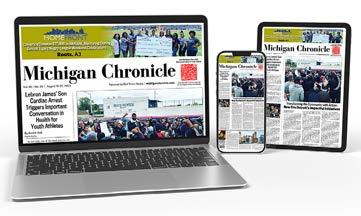



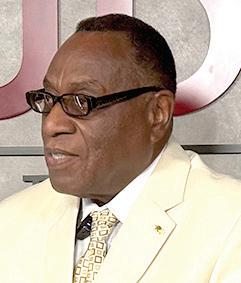
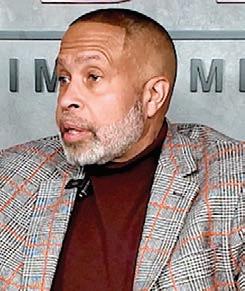

A3 | July 2-8, 2025
By Sam Robinson SENIOR REPORTER
The city of Pontiac will elect a new mayor this year as current Mayor Tim Greimel is running for Congress instead of seeking reelection.
Two candidates have the support of longtime lawmakers and popular lawmakers from Detroit and Southfield.
Candidates include councilman Mike McGuiness; former councilman and Oakland Forward director Kermit Williams; Sheriff’s deputy and former school board president Gill Garrett; Genesee County Land Bank Authority Sales & Development Director Alexandria T. Riley; former deputy mayor Mark E. Holland, Sr.; and former Pontiac mayor Deirdre Waterman.
McGuiness and Williams are highlighting endorsements from longtime lawmakers on the campaign trail.
McGuiness is endorsed by former U.S. Rep. Brenda Lawrence.
“Mike rolled up his sleeves because he saw a need,” Lawrence said in a statement. “I’ve had the pleasure to be his mentor and watch him grow into a man of integrity, a man of vision, and the man we are going to call the next Mayor of Pontiac.”
Williams is endorsed by Detroit City Councilwoman Mary Waters and Oakland County Commissioner Mattie McKinney Hatchett.

“Kermit Williams has been a consistent force for progress in Pontiac since his days with the Pontiac Area Young Democrats over 20 years ago,” Hatchett said. “His dedication to our community and his steady leadership show his unwavering commitment to making life better for families in this city.”
Pontiac Councilman Mikal Goodman told the Michigan Chronicle he’s looking for candidates who will support housing affordability and quality, small business funding, and public infrastructure improvements.
Improvements to Pontiac’s downtown are already happening thanks in part to $50 million in state funds. The Oakland County Board of Commissioners approved a $174.5 million budget last month to launch a transformative revitalization of the city’s downtown. The move will bring 700 county workers to downtown Pontiac.
Goodman pointed to the new youth recreation center currently under construction. The
See PONTIAC MAYORAL CANDIDATES Page A-4
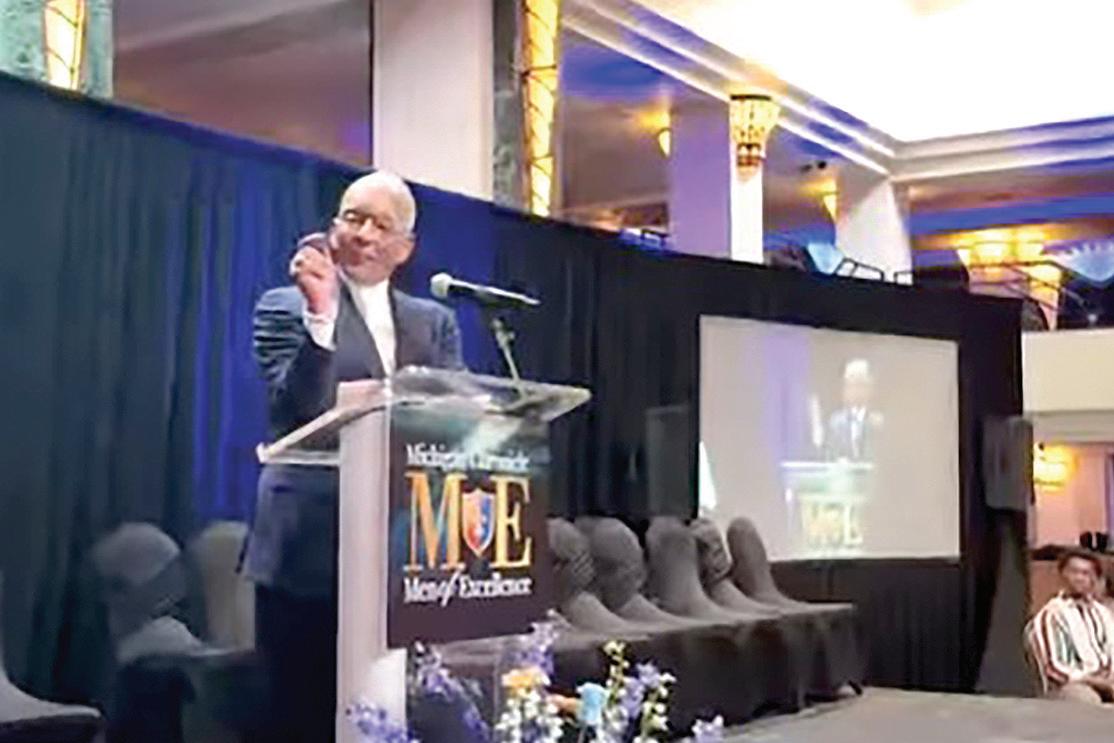
By Ebony JJ Curry SENIOR REPORTER
The room wasn’t just filled—it was charged. On June 27 at 6:00 p.m., Southeast Michigan’s Black Excellence gathered inside the International Banquet and Conference Center, where the Michigan Chronicle’s 2025 Men of Excellence ceremony reminded Detroit that greatness lives among us—working, building, and serving every single day. From the opening moment, it was clear this wasn’t a typical awards night. It was a homecoming. A declaration. A reminder that Black men in leadership— from union halls to hospitals, classrooms to courtrooms—carry the weight of generations and still lead with grace, strategy, and conviction.
This year’s class included CEOs, educators, public servants, and community builders. It also featured giants who’ve shaped Detroit’s historical and civic fabric for decades. Bishop Edgar Vann, George P. Barnes Jr., and Conrad Mallett were each honored with Lifetime Achievement Awards for their years of transformative leadership, vision, and service.
Bishop Vann, whose spiritual and civic leadership stretches far beyond the pulpit, spoke to the crowd with a reflective challenge: “Ask not of the world, but ask what you’ve poured into it. Ask if your walk added light, if your voice ever built instead of broke.” His words echoed the essence of the evening—service without ego and excellence without excuse.
George P. Barnes Jr., a political trailblazer and committed advocate for Detroit’s Black political structure, accepted his honor with a presence that reminded everyone in the room what legacy leadership looks like. Conrad Mallett, known both for his legal legacy and executive brilliance, was recognized for building pathways within systems that weren’t made for us—and doing so with an unshakable standard of Black integrity.
The energy shifted again when the Vanguard Award was announced. It went to Shawn Wilson, a force in corporate social responsibility and community impact. Though he couldn’t attend in person, Hiram Jackson, Real Times Media CEO, spoke powerfully on his behalf, describing Wilson as a man who “doesn’t just sit at the table—he brings chairs, builds more tables, and makes sure our people are seated with voice and power.”
As each honoree was called to the stage, the room gave more than applause—it gave recognition. Because these names represent more than career milestones, they are evidence of what happens when Black men are allowed to lead with vision, resourced with power, and protected by their community.
Michael Aaron, Business Manager and CEO of Local 1191, continues to uplift labor voices in Detroit, ensuring working-class Black men and women have the dignity and wages they deserve. Derrick Headd, Senior VP of Public Policy and Operations at the Detroit Economic Growth Corporation, has crafted policies that have shaped real opportunities for
Black business development across the city.
Neil A. Barclay, President and CEO of The Wright Museum, remains the gatekeeper of Detroit’s cultural and historical memory, while Lazar Favors, CEO of the Detroit Black Film Festival and Black Spirits Legacy, is using media and culture to shift narratives and elevate Black storytelling globally.
And still, the influence goes deeper.
Jody Connally, VP of Human Resources at Detroit Wayne Integrated Health Network, and Cedric Flowers, VP of Gas Operations at DTE, are changing how workforce and public utilities interact with Black communities—bridging systems with service. Darryl Gardner, Vice Provost at Wayne State University, stood as class president for the 2025 cohort and reminded guests that this moment wasn’t just about receiving recognition— it was about lifting up responsibility.
The evening also included a reading of the Men of Excellence Creed by David Campbell, grounding the event in principle and purpose. The creed wasn’t just a ceremonial reading—it was a reminder that titles don’t define men; values do.
This year’s list also acknowledged education as a pillar of progress. Jerlando F.L. Jackson, Dean of Education at Michigan State University, and Derrick Jones Lopez, Assistant Superintendent for DPSCD, are both reimagining Black student success and reshaping academic
By Ebony JJ Curry SENIOR REPORTER
The Michigan Chronicle continued to solidify its reputation as one of the nation’s leading Black news outlets, bringing home five national awards at the 2025 National Newspaper Publishers Association (NNPA) Messenger Awards, held June 26 in Savannah, Ga.
These prestigious awards, often referred to as the “Pulitzers of the Black Press,” celebrate journalistic excellence across the Black-owned press in the United States. The Chronicle’s five wins were part of a broader sweep by its parent company, Real Times Media (RTM), which secured 11 awards across its portfolio of publications.
The Michigan Chronicle earned honors in several high-profile categories, including: Second Place – Website Third Place – Layout/Design (Broadsheet) Third Place – Facebook Campaign Third Place – Instagram Campaign Third Place – Newsletter Excellence
These awards underscore the Chronicle’s deep commitment to digital innovation, storytelling, and impactful community journalism within an ever-changing media landscape.
Executive Editor Jeremy Allen expressed immense pride in the recognition, attributing the honors to the team’s relentless passion and dedication.
“These awards are a reflection of our mission to serve, advocate for, and uplift Detroit’s Black community,” Allen said. “The Black Press has always been a vital voice for justice, culture, and
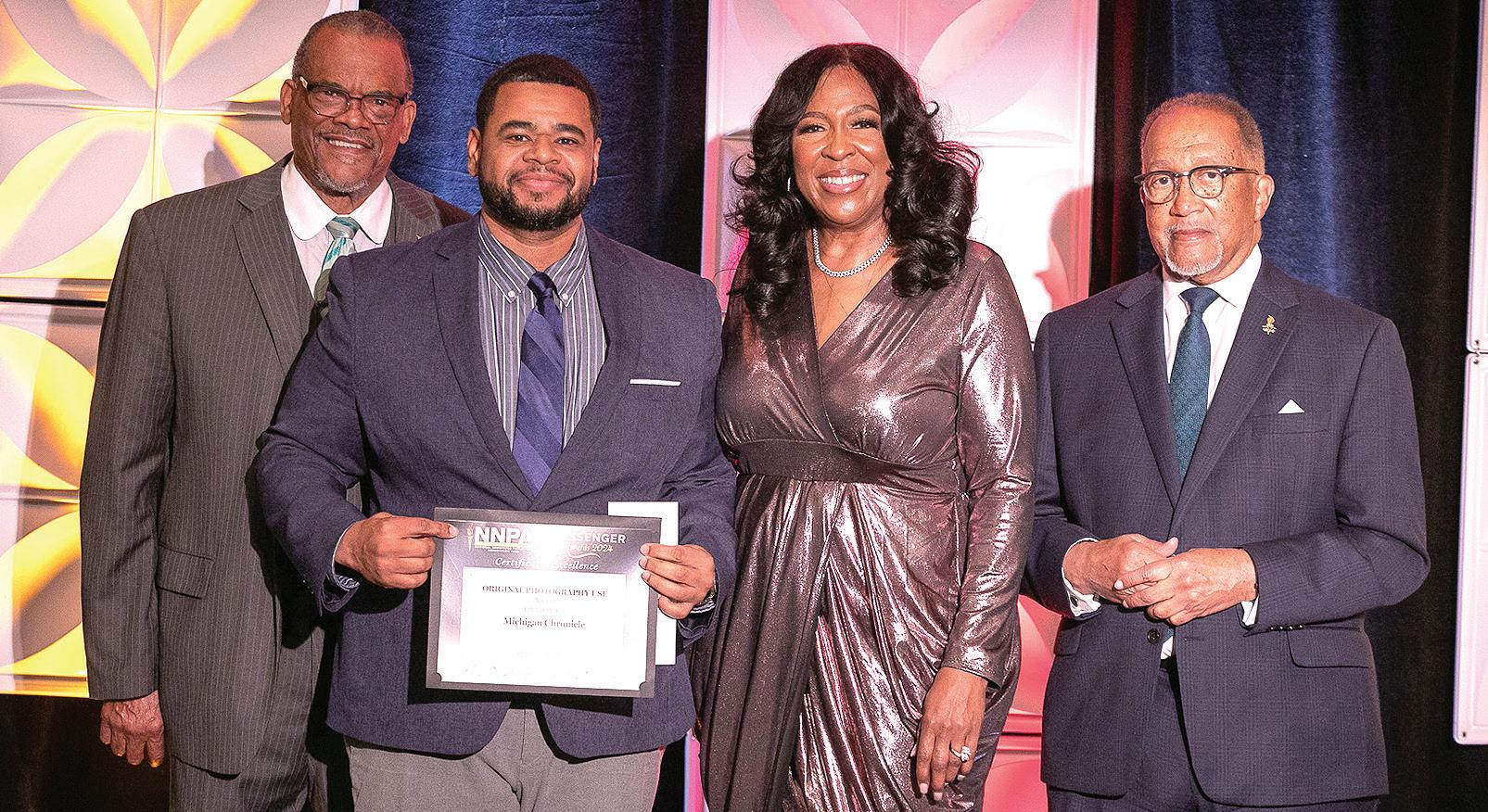
From page A-3
From page A-3
The Russwurm Award is annually awarded to the top Black newspaper in the nation. In total, the Observer brought home nine awards, with first-place finishes in Education, Business, Photography, Youth/Children coverage, and Facebook Campaign. It also earned second-place honors in Environment and Fashion/Beauty reporting and a third-place award in Social/Criminal Justice coverage.
While the Observer took top newspaper honors, the Michigan Chronicle’s consistent excellence across digital and print categories signals a strong, sustained presence in the ever-evolving media landscape. From visual presentation and user-friendly digital design to compelling social media campaigns and newsletters that keep the community engaged, the Chronicle continues to build on its nearly 90-year tradition of excellence.
“Our team strives every day to put together a product that not only informs but inspires,” said Allen. “We are a part of Detroit’s DNA. These awards reflect the countless hours our writers, editors, designers, and digital teams invest in keeping our community connected to the issues that matter most—from politics to culture, business to justice.”
Real Times Media’s success at this year’s awards reaffirms the strength of the Black-owned media ecosystem. Other standout winners at the NNPA ceremony included:
Houston Defender (7 awards)
Washington Informer (5 awards)
Philadelphia Tribune (5 awards)
Baltimore AFRO (4 awards)
St. Louis American (4 awards)
Atlanta Voice (4 awards)
LA Sentinel, NY Amsterdam News, and Savannah Tribune (3 awards each)
Another major highlight of the evening was the Publisher of the Year Award, which went to Shirley Barber James of the Savannah Tribune—a well-deserved honor recognizing her years of visionary leadership.
The success of the Michigan Chronicle and its RTM peers is not just about trophies and recognition; it’s about the power of storytelling in service to the Black community. As mainstream media faces questions of representation, bias, and trust, the role of the Black Press—represented through NNPA’s legacy—is more vital than ever.
“This isn’t just a win for the Chronicle or Real Times Media,” Allen said. “This is a win for every voice that refuses to be silenced, for every story that needs to be told, and for every reader who believes in the power of a free, truthful, and Black-owned press.”
As the Michigan Chronicle looks ahead, it does so with renewed purpose and momentum, fortified by these national honors and the enduring support of its readers. With the continued growth of its digital platforms and deep community ties, the Chronicle is not only honoring its historical roots but also shaping the future of Black journalism—locally, regionally, and nationally.
pipelines for our youth.
Healthcare honorees like Dr. Michael Pieh and Dr. Norris Polk continue to combat disparities while restoring trust in Black health outcomes. Business innovators such as Mamadou Diallo, CEO of Piston Group, and Phares A. Noel II, President of Diversified Engineering Concepts, continue to raise the bar for Black entrepreneurship and corporate excellence.
Detroit’s civic fabric was well represented. Hon. Byron Nolen, Mayor of Inkster, Raymond A. Scott, Deputy Director of Detroit’s Buildings and Safety department, and Rod Liggons of the Detroit Regional Chamber all showed what public service can look like when rooted in truth and strategy.
Others, like Ricky Fountain of the Community Education Commission and Khali Sweeny of the Detroit Boxing Gym, have built institutions—not for status but for survival and transformation. They work daily to ensure that youth, families, and neighborhoods are not left behind in a city moving toward reinvention.
The sponsors who made the evening possible spoke volumes, too—not only for their contributions but for their alignment. Local 1191, Vestco Management, Moulden Insurance Agency of Southfield, and Corewell Health each stood behind these men and the community they serve, reminding guests that partnership with purpose is how systemic change is built.
architects of Detroit’s next chapter. By the end of the evening, it was evident—this wasn’t a networking gala. It was a community declaration. A mirror for Black men in Southeast Michigan to see themselves reflected,

affirmed, and protected. It was a night that told the truth: our excellence is not hypothetical. It is daily. It is measurable. And it is undeniable. The 2025 Men of Excellence honorees are not an exception to the rule. They are the rules being rewritten. This celebration, curated by the Michigan Chron-
icle, does more than give awards. It documents the presence and power of Black men building in real time— and passes down the creed that their work will not be forgotten because it is still unfolding. Detroit showed up. And so did its legacy. And when we tell the stories right, we don’t just name names—we trace blueprints.

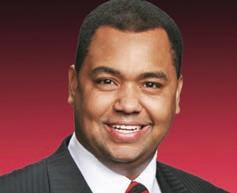


AUGUST 5, 2025
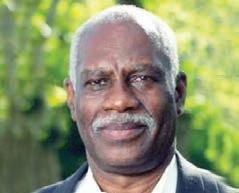
TO THE QUALIFIED ELECTORS OF DETROIT, MICHIGAN
From page A-3
McCarroll School at 191 North Glenwood Avenue sat vacant for years before the city approved a $30 million transformation last year.
The facility will include a gym, multipurpose room, and an indoor track or pool, the city said.
Goodman also mentioned the potential purchase of the old Pontiac Central School to serve as the new DPW building. Local leaders are inviting
Each honoree, whether from government, education, media, medicine, business, or community care, stepped into the spotlight with humility and purpose. Michael Everett Hall of Ford Motor Company, David L. Stone of Trion Solutions, and Clarence Rose of Arrow Strategies each brought a professional story that underscored a broader truth: Detroit excellence doesn’t need to be reimagined—it needs to be resourced.


PLEASE TAKE NOTICE that any qualified elector of Detroit, Michigan who is not already registered, register to vote at the office of the Detroit Department of Elections, the office of the Detroit City Clerk, office of the County Clerk, a Secretary of State branch office, or other designated state agency. Registration forms can be obtained at mi.gov/vote and mailed to the Detroit Department of Elections or the Detroit City Clerk’s Office. Voters who are already registered may update their registration at www.expressSOS.com
The last day to register in any manner other than in-person with the local clerk is Monday, July 21, 2025
the public to join them on Monday, June 23, from 6-9 pm on the second floor of the City Council Chamber, 4750 Woodward Ave., to learn more and offer input.
Greimel joined former attorney Christina Hines and Rochester Army veteran Alex Hawkins as a Democratic candidate vying for Michigan’s 10th Congressional District seat, currently held by U.S. Rep. John James, R-Shelby Township, who is running for governor.
Even honorees like Andre Ebron of City Year, Andre Smith of WCCCD, and Tanathan Nelson of TLN Consulting showed how mentorship, media, and operations leadership can stretch across sectors to build bridges others haven’t dared to walk.

After this date, anyone who qualifies as an elector may register to vote in person with proof of residency 168.492) at the Detroit Department of Elections or the Detroit City Clerk’s office.
Department of Elections City Clerk’s Office (Coleman A. Young Municipal 2978 W. Grand Blvd. 2 Woodward Ave. Ste. 106 Detroit, MI 48202 Detroit, MI 48226
These men represent more than success. They are
HOURS OF OPERATION:

NOTICE OF REGISTRATION FOR THE MUNICIPAL PRIMARY ELECTION TO BE HELD ON TUESDAY, AUGUST 5, 2025
• Regular business hours: Monday through Friday from 8:00 a.m. to 5:00 p.m. (Department of Elections)
TO THE QUALIFIED ELECTORS OF DETROIT, MICHIGAN:
• Monday through Friday from 9:00 a.m. to 4:00 p.m. (City Clerk’s Office)
PLEASE TAKE NOTICE that any qualified elector of Detroit, Michigan who is not already registered, may register to vote at the office of the Detroit Department of Elections, the office of the Detroit City Clerk, the office of the County Clerk, a Secretary of State branch office, or other designated state agency. Registration forms can be obtained at mi.gov/vote and mailed to the Detroit Department of Elections or the Detroit City Clerk’s Office. Voters who are already registered may update their registration at www.expressSOS.com.
• Saturday, August 2nd from 8:00 a.m. to 4:00 p.m. and Sunday, August 3rd from 9:00 a.m. to 4:00 (Department of Elections)
• Monday, August 4th – Absentee Voting ceases at 4:00 p.m.
• Election Day, Tuesday, August 5th from 7:00 a.m. to 8:00 p.m.
The last day to register in any manner other than in-person with the local clerk is Monday, July 21, 2025. After this date, anyone who qualifies as an elector may register to vote in person with proof of residency (MCL 168.492) at the Detroit Department of Elections or the Detroit City Clerk’s office.
Department of Elections City Clerk’s Office (Coleman A. Young Municipal Ctr.)* 2 978 W. Grand Blvd. 2 Woodward Ave. Ste. 106 Detroit, MI 48202 Detroit, MI 48226
PLEASE TAKE NOTICE that the City of Detroit will be voting in the Primary Election for the following offices:
HOURS OF OPERATION:
• Regular business hours: Monday through Friday from 8:00 a.m. to 5:00 p.m. (Department of Elections)
• Mayor
• Monday through Friday from 9:00 a.m. to 4:00 p.m. (City Clerk’s Office)
• City Council At Large
• Saturday, August 2nd from 8:00 a.m. to 4:00 p.m. and Sunday, August 3rd from 8:00 a.m. to 4:00 p.m. (Department of Elections)
• City Council District 2
• Monday, August 4th – Absentee Voting ceases at 4:00 p.m.
• Election Day, Tuesday, August 5th from 7:00 a.m. to 8:00 p.m.
• City Council District 5
PLEASE TAKE NOTICE that the City of Detroit will be voting in the Municipal Primary Election for the following offices:
• City Council District 7
• Mayor • City Council At-Large
• City Council District 2
• City Council District 5
Persons with disabilities needing accommodations should contact the Department of Elections at 313-876-VOTE (8683).
•City Council District 7
Persons with disabilities needing accommodations should contact the Department of Elections at 313-876-VOTE (8683).
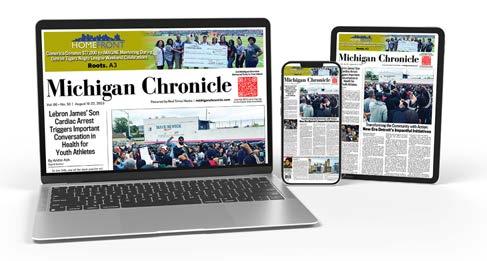


Use your Smartphone’s camera to scan the below QR Code for more access! Be sure to sign up for
A5 | July 2-8, 2025
By Dr. Anthony O. Kellum CEO OF KELLUM MORTGAGE, LLC
There’s one thing I’ll always love and deeply respect about real estate: it is, perhaps, the last truly accessible wealth-building path that remains in this country.
That may sound like an exaggeration to some. But for those of us who understand the way this nation is structured those who read between the lines of history, policy, and the present economy we know it’s not hyperbole. It’s truth.
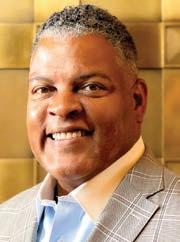
America has never been an equal-opportunity nation when it comes to wealth. Not for us. From the moment the first land deeds were written, from the Homestead Act to the GI Bill, access to property and the power that comes with it was systematically withheld from Black people. We’ve been redlined, disqualified, undervalued, and shut out of generational wealth pipelines time and time again. And yet, real estate is still here. Still accessible. Still capable of changing lives. Why Real Estate? Why Now?
Because in this moment, amid rising costs, inflation, student debt burdens, and a volatile job market, real estate offers something few other wealth vehicles do leverage.
You don’t need to be rich. You don’t need to have a perfect credit score. You don’t need a million-dollar inheritance. You just need the right mindset, access to information, and the courage to begin.
Here’s the truth: You can buy a duplex using an FHA loan with as little as 3.5% down. Live in one unit, rent out the other. That’s called house hacking. The moment you do that, you are no longer just a homeowner, you are a real estate investor. or even Non-QM products to shift your trajectory. And the truth is, many of us already have what it takes. We’re educated. We’re resourceful. And once you have that first property, you’ve built the foundation to do it again. One deal becomes two. Two becomes four. Now you’re building equity, generating passive income, and positioning yourself to play the game that was never designed for you—but that you’ve now mastered.
Compare that to other industries. Try launching a startup, buying stocks at scale, or navigating private equity with no network, no capital, and no margin for error. The barriers are sky high. But with real estate, your first deal can happen with strategy, discipline, and a commitment to learn. That’s power.
The Power to Shift the Narrative
This is more than economics. For Black families, real estate is one of the few remaining tools we can use to close the racial wealth gap in real, tangible ways. According to the Federal Reserve, the median net worth of a homeowner is nearly 40 times greater than that of a renter. Let that sink in.
Owning property doesn’t just improve your financial health it changes how you move in the world. It gives you leverage in your community. It gives your children stability. It builds legacy. And it forces this country to recognize your value in ways that can no longer be ignored or dismissed.
We don’t just need homes we need ownership.
See PATH TO WEALTH Page A-6

By Ebony JJ Curry SENIOR REPORTER
Renters across Michigan are living in properties with mold, rodents, broken furnaces, and collapsing ceilings—yet many have no legal protection when landlords ignore urgent repair requests. That reality is what prompted a new set of bills in the Michigan Legislature designed to give tenants more power and hold negligent landlords accountable.
The Tenant Empowerment Package made up of four bills, aims to confront Michigan’s rental housing crisis by establishing clear rights for renters and setting enforcement timelines when safety is at risk. It’s a legislative effort rooted in the lived conditions of families whose homes have been red-tagged, apartments that threaten public health, and communities that have long been silenced in housing policy.
Senate Bills 19 and 20 propose that if a landlord fails to address safety-related repair requests within 48 hours, tenants would have the right to withhold rent or pay for repairs themselves and deduct the cost from their rent. These bills are designed to give renters a path to action when their calls, emails, and formal complaints go unanswered.
“This bill is really making sure that we are targeting and holding accountable those who are bad actors,” said Remy Gelderloos, deputy chief of staff for state Senator Sarah Anthony of Lansing, who co-sponsored the package.
The legislation responds to a pattern seen across the state. In Lansing, hundreds of rental homes have been red-tagged—deemed legally uninhabitable—due to serious health and safety violations. These properties often remain occupied, with tenants trapped by poverty, lack of access to legal help,
or fear of retaliation. Similar stories surface from Detroit to Flint, where low-income Black residents are disproportionately impacted by dangerous housing conditions and have historically been denied consistent legal recourse.
“We’re seeing similar things across the state,” Gelderloos said. “And we want to try to nip away at the overall housing crisis. This is one direct way that makes sense.”
Senate Bill 21 focuses on financial protection. It would require landlords to provide 90 days written notice before raising the rent when renewing a lease. Currently, many tenants receive little or no notice before facing increased housing costs. This bill gives renters time to prepare, relocate, or explore legal options before being priced out of their homes.
That added time could be life-changing for Detroit seniors living on fixed incomes or single mothers working hourly jobs to keep their families stable.
Senate Bill 22 proposes that security deposits be returned electronically. Though seemingly administrative, this change directly addresses the way many tenants lose access to hundreds—or thousands—of dollars. When landlords delay returns or claim damages without proof, tenants are left with little ability to recover funds. Digital returns introduce transparency, prevent excuses, and ease the transition for those moving under stress or duress.
Together, the bills also add a critical requirement: if mold or pest infestations are reported, landlords must fix the problem within 72 hours. In many Black households across Michigan, pest infestations and toxic mold have gone unresolved for months, even years. The
impact of those conditions isn’t cosmetic—it’s about respiratory illness, mental distress, and unsafe living environments.
“This is critical to someone’s life and safety,” Gelderloos emphasized. “But we also need to understand and work with landlords, property owners, and others in the industry because sometimes it takes time.”
Lawmakers have built these timelines—48 hours for safety-related repairs and 72 hours for mold or pest removal—to reflect both tenant urgency and property maintenance logistics. They are not designed to be punitive. They are built to protect.
“At the end of the day, this solution is good for tenants, it’s good for those responsible landlords, and it’s good for the health of our housing market overall,” Gelderloos said.
That distinction is important. Not every landlord opposes tenant protections. Many already comply with maintenance standards, offer fair lease renewals, and support timely communication. But these bills name what has too often been protected in silence: there are landlords in Michigan who collect rent while leaving tenants in unsafe, unsanitary, and illegal conditions.
This legislative package gives the state a formal tool to distinguish responsible property owners from those who profit from neglect.
The Tenant Empowerment Package has passed through the committee and is now moving to the full Senate for a vote. If passed, it would shift the legal framework around renting in Michigan—placing enforceable accountability on landlords while giving tenants clear, actionable rights.
By Ebony JJ Curry SENIOR REPORTER
A classroom on the east side of Detroit was missing more than a few students this spring. On any given weekday, nearly half the seats sat empty. Teachers—many of them new, some still in training—struggled to stretch outdated reading materials across overcrowded classrooms. One educator said she counted 34 students assigned to a space designed for 22. No amount of passion could offset the silence that filled the room where textbooks and support staff should’ve been.
This is what underfunding looks like.
And as Michigan’s State Superintendent, Dr. Michael F. Rice prepares to step away from his role, he’s making it clear: public schools are making gains, but they cannot sustain them without real support from Lansing. That message was front and center during his testimony before the Michigan Senate Committee on Education, where he urged legislators to fund what’s working, fix what’s not, and stop leaving students behind.
“We have multiple goals of the Top 10 Strategic Education Plan
and multiple metrics for goals. In the last few years, Michigan has improved in many areas, some of which are at historic levels,” Dr. Rice told the committee. “No one metric defines public education.”
The superintendent pointed to measurable progress under his leadership. Michigan reached its highest four-year graduation rate—82.8 percent—in 2024. Career and technical education, Advanced Placement enrollment, dual enrollment, and Early Middle College programs have all climbed beyond pre-pandemic levels. The number of students earning college-ready AP scores has grown. Teacher preparation enrollment has risen steadily since 2016, increasing 71 percent. And a long-overdue literacy and dyslexia policy was finally signed into law this year.
But these successes don’t erase decades of structural neglect. Michigan continues to rank near the bottom nationally in K-12 education. Detroit, in particular, continues to battle chronic absenteeism and widespread literacy challenges. These aren’t isolated problems. They’re symptoms of a state that has yet to fully invest in equitable education.

That was echoed on the Mackinac Island stage just weeks earlier. Both Governor Gretchen Whitmer and Detroit Mayor Mike Duggan publicly criticized the state’s educational standing during the 2024 Mackinac Policy Conference, challenging lawmakers to meet the urgency of the moment.
Yet that urgency hasn’t reached every corner of the Capitol. While the governor’s executive budget and the Senate’s draft provide funding aligned with the Department of Education’s priorities, the Michigan House budget tells
a different story. It cuts funding to programs that experts say are essential to student success, especially for Black, Brown, immigrant, and rural students. The House proposal eliminates funding for LETRS training—Language Essentials for Teachers of Reading and Spelling—despite recommendations to make that training mandatory for all K-5 teachers. It also cuts funding for high-quality early literacy materials, zeroes out transportation reimbursements that help rural and urban districts alike, and repackages key
line items for English learners, career and technical education, and teacher certification into one broad block grant—an approach critics warn lacks the transparency and precision needed to support the students who need it most. These decisions have weight. For Detroit families, funding cuts often translate directly into limited access. Fewer buses. Larger classes. Lower teacher retention. And fewer culturally competent programs that reflect students’ lived realities. For Black and Brown communities—especially those navigating the ongoing aftermath of COVID disruptions and long-standing education gaps— this is much more than policy. It’s personal.
Michigan currently ranks 44th nationally in K–12 education, according to the 2025 Annie E. Casey Kids Count Data Book. That places the state near the bottom, with only six states ranking lower in fourth-grade reading on the 2024 NAEP. A decade ago, Michigan’s education position hovered closer to the middle of the pack—around the mid-30s in national standings.
From page A-5
The push for statewide reform connects directly to the work already happening on the ground in cities like Detroit, where organizers successfully fought to establish a Right to Counsel ordinance in 2022.
Detroit’s Right‑to‑Counsel or dinance was spearheaded by Detroit City Council President Mary Sheffield, who intro duced the ordinance in May 2022 with unanimous Council approval. But this legislative victory was built on persistent community organizing. The Detroit Right to Counsel Co alition, comprised of over 20 organizations and hundreds of residents, drove the push through advocacy, meetings, and public mobilization over several years. That policy pro vides free legal representation to low income tenants facing eviction—an initiative born out of decades of displace ment, landlord intimidation,
and courtrooms where renters stood alone while management companies arrived with attor neys.
But Detroit’s Right to Coun sel only addresses one part of the crisis: the end stage, when tenants are already at risk of being removed from their homes. The Tenant Empow erment Package complements that local fight by stepping in much earlier—before tenants are forced to choose between silence and retaliation before families are pushed into unsafe living conditions without legal leverage.
Michigan has already proven that policy can respond to people’s power. Detroit’s ordinance didn’t pass because leadership suddenly priori tized poor tenants. It passed because the community orga nized, protested, lobbied, and refused to be dismissed. This statewide legislation follows that same path—designed
From page A-5
In contrast, Mississippi has climbed from 48th in 2014 to 16th in this year’s rank ings—leaving Michigan in its rearview. Witnessing that turnaround after nearly a decade below Michigan—and surpassing us now—is a stark reminder: this should hit lawmakers like a dagger to their con science.
Dr. Rice’s call to legislators was clear: reverse course while there’s still time.
Among the department’s legislative re quests are smaller class sizes in high pov erty K 3 classrooms—where early reading skills are shaped. Research consistently shows that children in these classrooms benefit significantly from more individu alized instruction, which is only possible with more educators and fewer students per teacher.
Another request involves reinstating in person instructional time. Legislative changes between 2019 and 2023 reduced Michigan’s required face to face school days from 180 to as few as 149, once ac counting for emergency closures, virtual days, and professional development that counts as instructional time. That change, though subtle on paper, has real world consequences for students who need con sistent structure to stay on track.
Funding for early literacy materials remains a non negotiable, as does manda tory LETRS training. Dr. Rice reminded
not for headlines but for the families whose lives hang in the balance when lawmakers delay action.
Tenants are not asking for a handout. They are demanding the right to live in homes that won’t harm them. The Senate vote on this package will reveal which leaders understand that housing is a human right—and which ones remain comfort able protecting a system where survival depends on silence.
For Detroiters who have long been navigating power outages, burst pipes, or in festations without recourse, these bills could represent more than reform. They would affirm dignity in housing—not through charity or short term relief, but through law.
And that matters. Black renters have historically been the most vulnerable to hous ing injustice in Michigan, from redlining and eviction targeting to lead poisoning and housing court disparities. The weight of bad housing policy
lawmakers that improving literacy starts with equipping teachers—not just with passion but with proven tools.
Meanwhile, the state has already in vested $1.1 billion across three fiscal years to confront the teacher shortage. Those dollars fund fellowships and stu dent teacher stipends, “Grow Your Own” programs, rural credentialing hubs, and loan repayment options for new teachers. But without a budget that continues and expands these efforts, that pipeline could dry up—leaving students with less access to certified educators, especially in dis tricts already struggling to fill classrooms.
That’s where the moment gets more complicated.
Dr. Rice is stepping down soon, and a new superintendent will inherit both the progress and the political pressure. That means the work of lobbying lawmakers— of pushing back against cuts and push ing forward new investments—won’t end with this testimony. It’ll fall on the next leader to keep education at the top of Michigan’s legislative agenda, even as competing priorities dominate the politi cal calendar.
But Dr. Rice’s legacy offers a roadmap. He showed that strategic investment, cou pled with high expectations and account ability, can produce real outcomes. His tenure proved that with the right funding and focus, Michigan students can thrive— especially when systems are built to see their full potential. Still, those gains won’t last without continued commitment.
Energy is the key that unlocks the world of travel, turning every trip into an unforgettable experience. From the thrill of exploring new places to the joy of creating lasting memories with loved ones, energy is what makes it all possible.
With innovative energy solutions, we’re modernizing, protecting and maintaining our energy super systems to fuel travel and exploration today and into the future.
doesn’t just rest on infrastruc ture. It rests on people. It stunts development. It harms health. It strips stability. That’s why this legislative moment demands attention.
The 90 day rent increase notice isn’t just about logis tics—it’s about giving families time to stay housed. The 48 hour repair mandate doesn’t just address broken property— it ensures no child sleeps under a collapsing ceiling. The elec tronic deposit return isn’t just about modern convenience— it’s about economic justice for people already living with less.
These are the layers of hous ing policy too often overlooked when lawmakers only speak to homeowners. But renters, particularly Black renters, are the backbone of Michigan’s urban centers—and their lives deserve legal protections that reflect their humanity.
Now the question moves to the Senate floor: will Mich igan’s leadership meet this moment?
In Detroit, where children often face the intersection of poverty, trauma, hous ing instability, and underfunded schools, these policies aren’t abstract. They’re the difference between grade level reading and falling behind. They’re the difference between graduating with opportunity or graduating with barriers. They are the frontline of educational justice.
And Michigan’s Black Press has long chronicled the disparities that make eq uitable education an uphill battle for too many of our families. We know that when the system fails our children, the conse quences ripple across generations.
So, the question is no longer whether Michigan can improve. The data shows that it can. The question is whether law makers will choose to continue that growth—or retreat to politics that prior itize short term savings over long term solutions.
Students have already done their part. Teachers have stretched thin. Parents have fought to be heard. Now, it’s up to legislators to meet the moment.
Because progress without permanence is just a pause. And our communities cannot afford another reset. Not now. Not again. Not when our children are already waiting.
This budget season, the eyes of educa tors, advocates, and families remain fixed on Lansing. The hope is simple, but it runs deep: fund what’s working, fix what’s broken, and finally give every Michigan student—not just the privileged few—a fair shot.
From page A-5
Because ownership creates accountability. It shapes political power. It anchors families. And in a world where we’re constantly told what we can’t have, it gives us something that cannot be taken lightly: agency.
What’s Holding Us Back?
For many of us, it’s not ability. It’s access. It’s not intelligence. It’s information. Too many brilliant, educated, and capable Black professionals still believe homeownership is out of reach. They’re managing six figure ca reers while renting year after year. They’re told the market is too hot, or interest rates are too high, or that they’re too late.
But here’s what I tell my clients: You’re not too late. You’re right on time.
Because now, more than ever, we need a generation of Black investors, homeowners, and property holders who are not just buying for themselves but building for those who will come after them.
It starts with one property. That duplex? It could be your launchpad. That single family home you renovate and rent out? That’s your business. That four unit building you own in the neighborhood your parents grew up in. That’s redemption.
You don’t need 100 doors to start. You need one.
And with the right education, the right community, and the right support system, that one door can unlock an entirely new future for you, for your children, and for gen erations to come.
The Property is Power Perspective
At Property is Power, we’re not just talking about buying homes. We’re talking about re claiming space. About building institutions, not just portfolios. About changing the way our people engage with money, ownership, and legacy.
This work isn’t just personal it’s political. It’s historical. It’s transformational.
If you’re reading this and you’ve been on the fence thinking it’s too risky, too late, too expensive, I invite you to challenge that belief. You don’t have to do it alone. You just have to be willing to do it differently.
This isn’t about speculation. This is about using existing tools FHA loans, house hacking, down payment assistance, or even Non QM products to shift your trajectory. And the truth is, many of us already have what it takes. We’re educated. We’re resourceful. We’re com munity minded. What we often lack is permis sion not from the system, but from ourselves to believe that this path is possible.
Let’s move from consumer to creator.
Let’s move from surviving to building. Because Property is Power. And it’s our time to own it.
Property is Power! is a movement to promote home and community ownership. Studies indicate homeownership leads to higher graduation rates, family wealth, and community involvement.

Detroit mayoral candidates outlining the needs of young residents and recent graduates say the city must spur the growth of the region’s tech industry and improve public transportation.
Candidates, including Mary Sheffield, Saunteel Jenkins, Fred Durhal III, and Todd Perkins, pitched ideas at a recent debate Saturday at the Eastside Community Network.
Focusing on young professionals has become a sticking point for Mayor Mike Duggan, who asked residents after his election in 2013 to judge him by whether or not he could increase the city’s population. While there are about 40,000 fewer residents in the city since 2013, Detroit, under Duggan, has seen an increase in residents over the last two years.
U.S. Census Bureau released data earlier this showing Detroit gained 12,487 residents since last year’s estimate. The latest data revealed an increase of 6,791 Detroiters in 2024. Plus, the addition of 5,696 Detroiters, who the Census Bureau acknowledged had been undercounted from 2021-2023. Duggan, who is running for governor as an Independent, successfully sued the Census Bureau over its counting methodology. The city’s reported increase in 2024 was its first since the 1960s.
Duggan’s gubernatorial campaign has focused on young people, meeting students on college campuses across the state and leaning into memes and alternative media channels. He says young people are driving Detroit’s population growth, but the full picture won’t become clear until more data is available.
Candidates were asked about their strategy for growing the city and retaining young people at the forum Saturday hosted by Outlier Media. Organizers said former police chief James Craig and Triumph Church pastor Rev. Solomon Kinloch were set to participate but were absent from the debate.
Here’s what they said they would do to support up-and-coming Detroiters: Mary Sheffield: “What they want is a destination of opportunity. Often times they leave Detroit for big cities like Chicago, New York, L.A., DC, because of opportunity. We have to continue to drive that Detroit is a place for opportunity, where their dreams can be realized and their purpose can
By Ebony JJ Curry SENIOR REPORTER
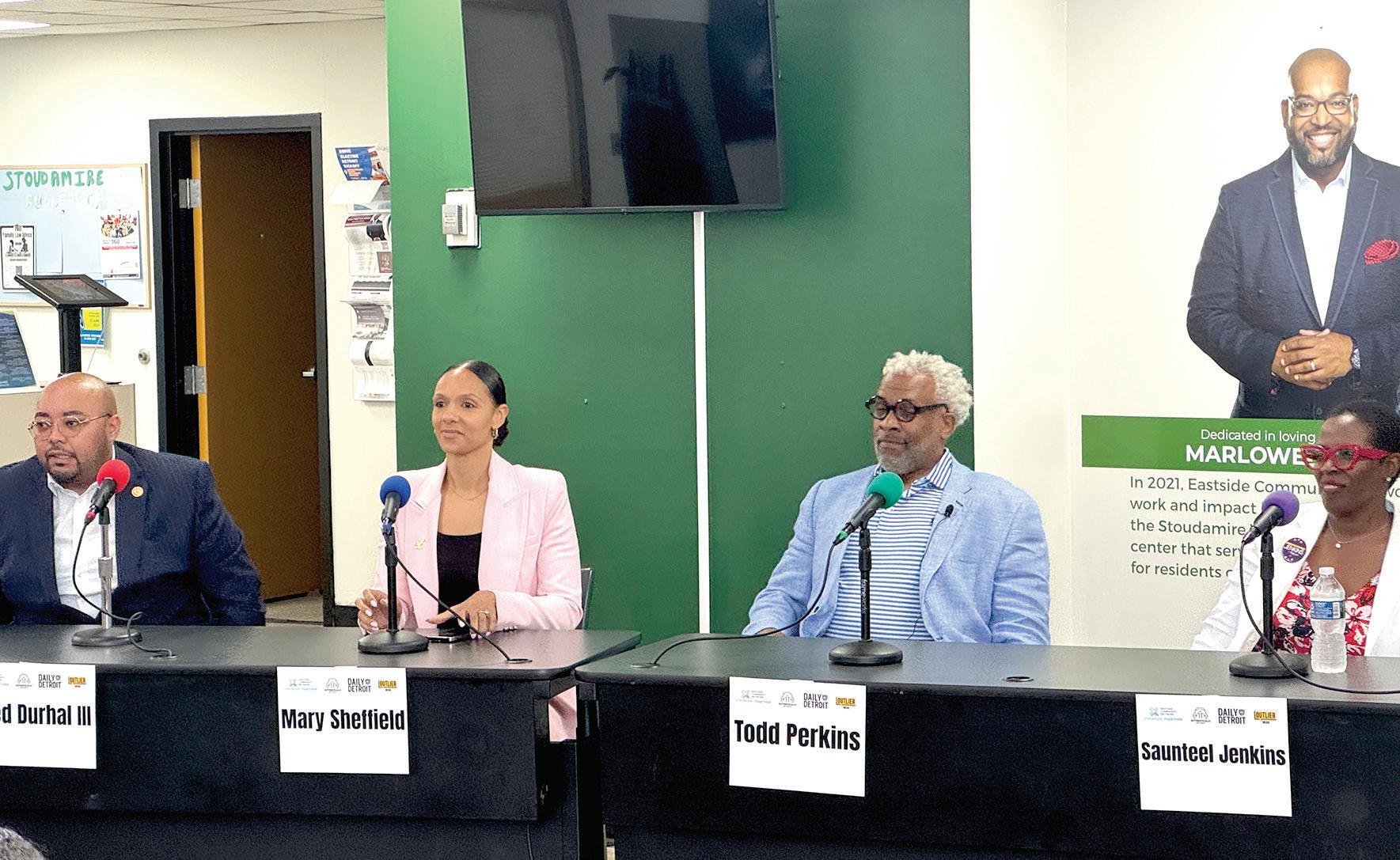
be fulfilled. Whether that’s access to high demand, high wage jobs, mass transportation and regional transportation and a path to homeownership. We have to improve our school system because a lot of young adults are starting families and want to raise their children here. So often it goes back to how do we cultivate an environment that creates a place of opportunity that can compete with other cities.”
Sheffield, whose campaign is inviting feedback from young residents through its youth advisory council, said she wants to completely revamp the city’s Youth Services Department within the mayor’s office. She said young people will have a seat at the table to help drive policy decisions that are made. Sheffield’s campaign has held events focused on young residents. Her campaign has a getout-the-vote mixer, dubbed “No Vote, No Voice!” set for this Saturday, June 28, at the Shadow Gallery, 1533 Winder, from 6-9 pm. Todd Perkins: “It starts with public safety, education, affordable housing and economic development. Our plan is having a youth council. I want to have direct access to youth, and I want to start earlier than just 18. I want
State Representative Donavan McKinney stood on Detroit’s northeast side as a child, witnessing firsthand the impact of housing insecurity, low wages, and inconsistent government support. His family moved more than a dozen times. His mother held multiple jobs to keep the lights on. That upbringing shaped how he approached policy, accountability, and political service.
Now, U.S. Senator Bernie Sanders has endorsed McKinney for Congress in Michigan’s 13th District. The endorsement came just six weeks into McKinney’s campaign, making it the first public show of support in the race from a sitting U.S. Senator. The move signals Sanders’s alignment with McKinney’s legislative record and policy priorities in the Michigan House and reflects a broader coalition forming around McKinney’s campaign.
“I’m proud to support Donavan McKinney for Congress in Michigan’s 13th District. Donavan is exactly the type of leader we need in Washington right now,” said Sanders. “He understands the struggles working class communities are facing in Detroit and across the country because he’s lived those struggles himself. In the State Legislature, he has fought to get big money out of politics and taken on powerful special interests.”
Sanders emphasized McKinney’s record of advocacy on issues like the minimum wage, public housing investment, public school funding, and Medicare for All. He also highlighted McKinney’s background as a union leader and his alignment with labor organizing efforts.
“As a Member of Congress, Donavan will fight to raise the minimum wage to a living wage, fully fund our public schools, invest in public housing and support Medicare for All. A former union leader, he has dedicated his life to standing with working people, and is ready to lead the struggle against Donald Trump, the oligarchy, and the corporate interests who prioritize profits over people.”
McKinney acknowledged the endorsement as a powerful affirmation of his legislative values and lived experience, particularly as someone who came from working-class circumstances in Detroit.
“Senator Sanders has long been a progressive champion for working class Americans and I am honored to receive his endorsement,” McKinney said. “His political courage and his commitment to doing the right thing — even when it’s unpopular, even when it’s hard, even if he’s alone — are a true inspiration to me.”
McKinney reflected on his childhood in northeast Detroit, where federal programs like food assistance and after-school care provided needed support. He connected that experience to his call for federal policies that center equity and reflect the lived conditions of marginalized communities.
“When I was a child, my mother often had to work two to three jobs just to keep our lights on, and government programs like food stamps and free after-school care helped keep me fed and safe from the gun violence plaguing our community. I understand firsthand just how critical it is to have progressive, working class leaders pushing for federal
to start from high school all the way up to 25 years old, to have a youth council that has a say in the framework, in the development of this particular city. I want them to be invested in this as they go off to college. There’s a fellowship program that’s working through the mayor’s office that definitely needs to be expanded so that these individuals understand they have opportunities within the city government, but also to expand it to work in a public-private capacity and give them access to corporations that are developing in our city. That’s how you keep them. I have a son who’s a junior at Howard University right now and my concern is whether or not he’s going to want to come back to Detroit and find his trade in computer science. We know people are coming to the city — Apple is coming to our city. So we want to make sure that Detroiters are first, and when we put Detroiters first, we make sure that we retool our society so that they have the retraining that’s necessary to be able to have access to these jobs, so these corporations can’t default and say, well, ‘They weren’t ready.’ We know they’re coming, so let’s get them ready right now.”
Perkins said he knows people who work in the city whose chil-
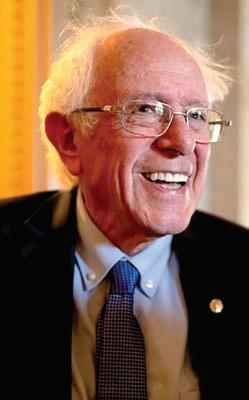
dren have left because of the absence of mass transit. He wants DDOT to work with the regional transit authority to connect communities. Fred Durhal III: “In these discussions that I have with professionals who have graduated from college, what they look to move to cities for is a place where things are happening. When we talk about development, when we talk about opportunity, when we talk about tech and mobility and innovation, we have yet to tap into that untapped potential Detroit has to grow those industries where folks want to come back here. We’ve got to have a greater focus on that, we’ve got to continue developing — whether that’s downtown or whether that’s industrial in some areas where that’s conducive to do so to attract bigger businesses to come here. There’s a lot of talent that leaves here, talent retention is important and so we’ve got to create that path so when our children are even in high school and start promoting that ‘We want you to come back here.’ Connect them to those jobs and to that path so by the time they graduate from the 12th grade they know they want to come back here. We’ll focus on regional transit, development and
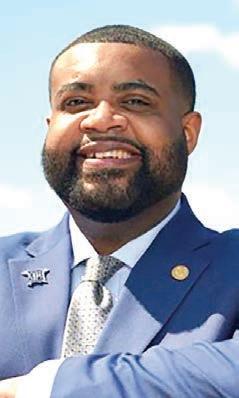
government policies that truly uplift all people, not just the wealthy and well-connected,” he said. “Senator Sanders has been fighting that fight for decades, and I look forward to fighting alongside him for our community, and for working class communities nationwide in Washington.”
The campaign has attracted additional support from Justice Democrats, the national political group that helped elect Alexandria Ocasio-Cortez, Summer Lee, and Rashida Tlaib. The organization is known for backing progressive candidates who challenge incumbents and oppose corporate PAC contributions. McKinney’s inclusion among its endorsed candidates adds national organizing capacity to a race that has drawn increased attention.
Within six weeks of launching his campaign, McKinney has received endorsements from more than 30 public officials representing various levels of government across Michigan’s 13th District. That list includes Congresswoman Rashida Tlaib, State Senators Darrin Camilleri, Mary Cavanaugh, Stephanie Chang, Veronica Klinefelt, Sylvia Santana, and Paul Wojno. Support also comes from State Representatives Stephanie Young, Erin Byrnes, Kimberly Edwards, Alabas Farhat, Peter Herzberg, Matt Koleszar, Tullio Liberati, Tonya Myers-Phillips, Veronica Paiz, Laurie Pohutsky, and Dylan Wegela.
Additional endorsements include former State Representatives Abraham Aiyash, Jaime Churches, and Alberta Tinsley-Talabi; Wayne County Commissioners Alex Garza, David Knezek, and Allen Wilson; as well as city leaders such as Wyandotte Mayor Pro Tempore Kelly Stec, Southgate City Councilwomen Victoria Araj and Priscilla Ayres-Reiss, and Dearborn Heights City Councilwoman Nancy Bryer. Support also extends to Allen Park Councilman Gary Schlack, Wyandotte Councilman Chris Calvin, and community advocates such as Pastor Sterling H. Brewer and Wayne-Westland School Board Member At-Large Melandie Hines. McKinney currently serves as State Representative for Michigan’s 11th District, covering parts of Wayne and Macomb Counties. He was first elected in 2022 and re-elected in 2024. When he won his seat, he became one of the first two Black leaders to represent Macomb County in the Michigan Legislature. Prior to holding office, he was a member and leader in SEIU Healthcare Michigan, the state’s
largest healthcare union.
creating a place that’s for families again.”
Durhal said he has first-hand experience pitching Detroit livability to young people. He convinced his wife to come back to Detroit from DC, where she moved to clerk for a federal judge after promising her he would make the city better for their children.
Saunteel Jenkins: “Jobs I believe is the greatest factor in keeping young people here and attracting them. We have to have the industries and the jobs of today and tomorrow, building new industries and keeping them here. Right now, when you go to Black Tech Saturday’s or when you go to NewLab, there’s probably 90 to 100 startup tech businesses there. As they grow and become too big for NewLab, we need to have options to grow and stay here in Detroit and hire Detroiters for those jobs. We should attract and recruit students from Wayne State and Michigan State and UofM who can come here, live, work, play. And then when you’re ready to raise a family, there’s quality, there is quality, affordable housing available to you in a safe, viable neighborhood for you and your family and send your kids to a high quality school.”
In 2020, Governor Gretchen Whitmer appointed McKinney to Michigan’s first Environmental Justice Council, where he played a role in shaping the $2 million Water Restart Grant Program and the state’s Water Reconnection Executive Order during the height of the COVID-19 pandemic. These policy efforts aimed to ensure equitable access to clean water and utilities during a public health emergency. McKinney is a graduate of Detroit Public Schools and the first college graduate in his immediate family. He lives in Detroit with his wife, Shaunté, and their two children.
The contrast between McKinney and the incumbent, Shri Thanedar, has become a defining feature of the campaign. Thanedar, a multimillionaire and self-funded candidate, has spent over $17 million of his personal wealth on Congressional campaigns since 2021. Recent records show he reimbursed himself nearly half a million dollars from House funds, while over half of his 2024 campaign expenditures went toward advertising and printed materials. That percentage significantly exceeds the 5% national average for House members.
Critics have pointed to Thanedar’s self-promotion spending and lack of responsiveness to constituents as key concerns. His office has faced allegations of poor service delivery, and his campaign finance records show contributions from corporate PACs, including entities connected to the pharmaceutical industry, defense contractors, and utility providers such as DTE Energy. These connections have drawn scrutiny in a district where residents face persistent energy shutoffs and affordability challenges.
As the campaign enters its next phase, voters in Michigan’s 13th District will evaluate competing approaches to representation, community engagement, and policy leadership. The Sanders endorsement adds national momentum to McKinney’s grassroots efforts but also intensifies the stakes. The District, encompassing parts of Detroit and surrounding cities, has a long history of civic activism and political scrutiny — voters often demand more than just party affiliation.
McKinney’s campaign focuses on federal investments in education, housing, labor rights, environmental justice, and health care. His platform emphasizes removing corporate money from politics, expanding protections for working families, and increasing access to public services that historically underinvested communities depend on.
The race for MI-13 is expected to continue drawing attention as more residents, organizers, and policymakers weigh in. Whether national endorsements influence local outcomes remains to be seen, but the framing of this contest has shifted. The endorsements and critiques are now on public record, and the voters will determine how they respond.
For McKinney, this campaign is an opportunity to advance the policies that shaped his own survival. For Sanders, it’s about sending someone to Congress who has already shown up for the people before ever stepping into Washington. For Detroit and its surrounding communities, the next member of Congress will have to earn trust beyond endorsements — by listening, showing up, and remaining accountable long after the votes are counted.

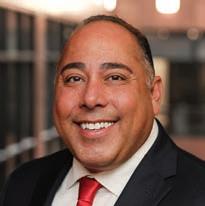

Ed Siaje President,



















By Sam Robinson SENIOR REPORTER
Two people were injured after being shot near thousands of people who were gathering at Spirit Plaza and Hart Plaza for Detroit’s 67th annual Ford Fireworks Show.
Detroit Police Chief Todd Bettison told media Monday night after the fireworks show ended that victims, including two juvenile males and a female in their 20s, were treated for non-life-threatening injuries. The shooting stemmed from a fight that began on Randolph and Larned, about a block away from the festivities.
“I had officers right in the area and they responded immediately, aiding the injured and actually based off the description, did detain one young person,” Bettison said. “That person was not involved and was not a suspect, however, we do have great video of the suspects.”
The city’s policing strategy during the night of the fireworks has been a point of contention for several years.
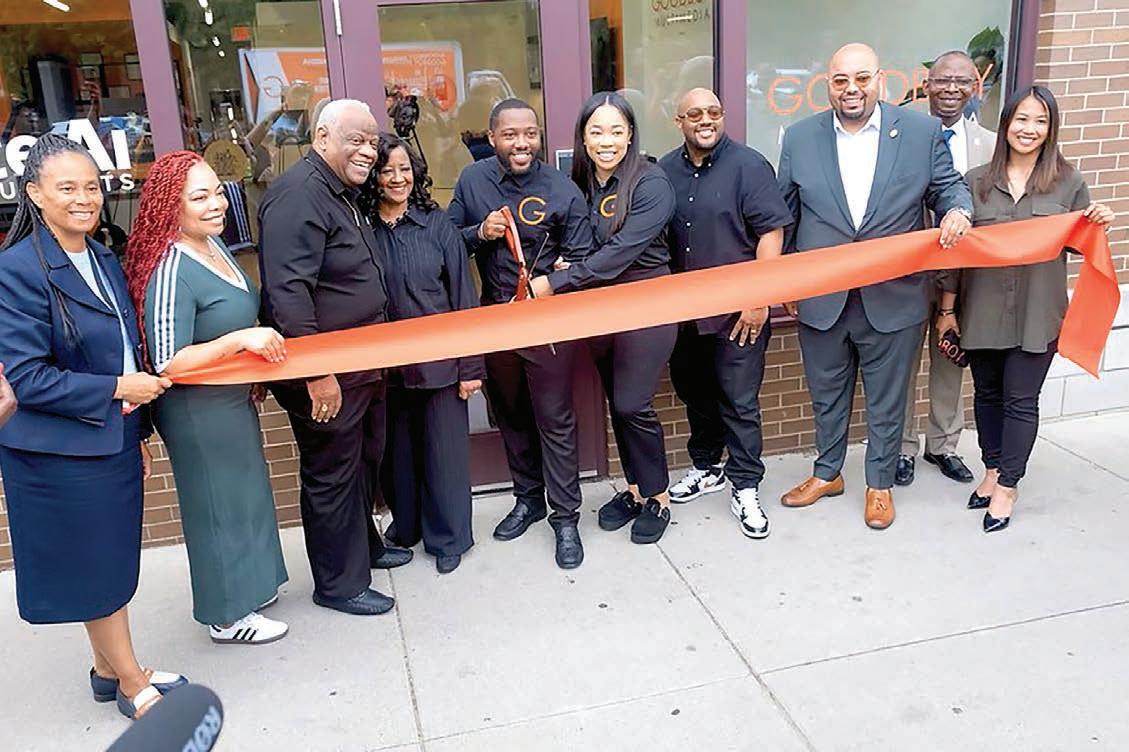

The city closed down parks during fireworks across the riverfront. Closures span from Gabriel Richard Park near Belle Isle to Huntington Place. Residents nearby AB Ford Park, the Dequindre Cut, and Mt. Elliot Park all the way to the West Riverfront are blocked from enjoying the show from those public parks due to safety concerns.
“When you talk about quality of life to attract and retain residents, the ‘control’ for an event like the fireworks seems counterproductive,” said columnist Karen Dumas. Her post to social media sparked a debate over whether shutting down parks increases public safety.
Detroit police officers were stationed at public parks, directing families away prior to the beginning of the show, which started around 10 p.m. A video posted to social media Monday showed officers directing people away from Stockton Park on the city’s east side.
The shooting happened at 10:04 p.m., Bettison said.
“I’ve been working the fireworks for 30 years and I can tell you that tonight, this was less than I’ve seen in the past,” Bettison said.
Police didn’t report any serious injuries outside of the shooting incident.
“The police presence was good, but I still think they need to do more; we can’t have this violence,” community activist Stephen Hawking said during Detroit City Council public comment on Tuesday.
Other members of the public called in to say they didn’t notice the fights.
“You guys did a good job last night, keep the parks closed,” Republican activist Melissa Love said during public comment.
By Jeremy Allen EXECUTIVE EDITOR
A few years ago, Daniel Jones was a volunteer in the back of his church sanctuary, managing Sunday livestreams with a borrowed camera and a vision he couldn’t yet name. Now, he’s cutting the ribbon on Goodboy Multimedia’s new headquarters in Midtown Detroit—a creative studio built from grit, service, and a mission to mentor Detroit youth into media careers.
Goodboy Multimedia, co-owned by Daniel and his wife Yasmine Jones, officially opened its doors last week at 3939 Woodward Ave. The company is the 189th brickand-mortar business to open through the City of Detroit’s Motor City Match program. The new location marks a significant milestone for the business, which previously operated out of Clinton Township but always had Detroit in its heart.
Jones, a Detroit native and graduate of Eastern Michigan University, didn’t plan on being a media entrepreneur. He stepped into the work in 2019, simply trying to support his church’s growing need for tech-savvy support during services. But his hands-on learning—working everything from video production to live streaming and sound— sparked something larger. “The journey started with me just trying to help out at church,” Jones said. “I had to learn every piece of the process, from camera angles to live streaming, and eventually realized how many people needed those same services done well.”
When the pandemic hit, that realization turned into a critical calling. With congregations forced online and local businesses scrambling to maintain visibility, Goodboy Multimedia stepped up. Churches across Detroit leaned on the company to get their sermons streamed reliably. Small businesses needed help looking professional in virtual meetings. Jones and his team provided more than technology—they helped maintain community connection in isolation.
Today, Goodboy Multimedia delivers
full-scale multimedia production—video, photography, graphic design, DJ services, and more—for clients across sectors. That includes high-profile names like the State of Michigan, Motor City Casino, and the Detroit Branch NAACP.
The new Midtown location, backed by a $30,000 grant from Motor City Match Round 25, is more than just office space. It’s a creative home base. Renovations supported by the grant helped the team design a space that reflects the vibrant culture of Detroit while providing room to grow and build out their services.
“I knew I wanted to be downtown, to be part of the energy here,” Jones said. “Motor City Match helped me do that and set us up to keep growing and mentoring other creatives.”
Goodboy employs five full-time staff members and contracts with more than 30 creative professionals. But Jones isn’t just growing a business—he’s building a pipeline. Through the Adamark mentoring program, Jones trains Detroit high school students in the same media skills that launched his own journey. Over the course of eight weeks, students learn hands-on skills in video editing, audio engineering, digital design, and real-world production workflows.
So far, more than 60 students have graduated from the program, which has become a springboard into internships, freelance work, and even entrepreneurial paths. “Mentorship is a priority,” Jones emphasized. “Detroit is full of talented young people, but too many don’t get access to the equipment or experiences that help them see what’s possible.”
His wife and business partner, Yasmine, serves as the creative director of Goodboy Multimedia, ensuring that the company’s visual identity and project standards reflect excellence and authenticity. Together, they have built something that resonates with both clients and the city.
“Goodboy Multimedia shows exactly what makes Detroit’s small business community so special,” said Deputy Mayor
Melia Howard. “Daniel is creating jobs, training the next generation and delivering top-notch services, all while investing back into his hometown.”
Motor City Match has now supported 189 brick-and-mortar openings across Detroit, contributing more than $19.5 million in direct cash grants and helping to leverage over $104 million in investment. Of all businesses supported by the program, 85 percent are minority-owned, 70 percent are women-owned, and 68 percent are owned by Detroit residents.
“Daniel has built something special here with talent and purpose all rolled into one,” said Sean Gray, vice president of Small Business Services at DEGC. “Goodboy doesn’t just deliver great creative work. It’s creating real opportunities for local talent to build careers.”
Jones said one of his next goals is converting more of his contracted creatives into full-time employees, deepening the company’s roots in Detroit. Inside the studio, his team practices cross-training, ensuring that everyone gains exposure to the different facets of multimedia work. This collaborative environment mirrors the kind of support Jones himself wished he had earlier in his career.
The Midtown location—nestled in Detroit’s District 6—places Goodboy Multimedia at the crossroads of innovation, culture, and community. For a city where storytelling has always been a form of resistance, celebration, and healing, multimedia companies like Goodboy are more than a business model—they’re a reflection of Detroit’s creative muscle and entrepreneurial future.
“This isn’t just about us,” Jones said. “It’s about what we’re building for the next generation. Detroit needs more creators. We’re here to make sure they get the skills, the space, and the belief that they can do this too.”
For more information about Motor City Match or to apply for upcoming grant rounds, visit www.MotorCityMatch.com. Applications open quarterly.
By Jeremy Allen EXECUTIVE EDITOR
It’s clear that the world once again sees Detroit as a city with global significance. That fact is underscored by the countless number of events, conferences, and forums the city hosts each year that bring people and eyes to the Motor City.
Up next, Detroit will play host to an extraordinary gathering of cultural icons, policymakers, entrepreneurs, and activists for the inaugural Global Citizen NOW: Detroit summit this July 10. For the first time, Global Citizen is bringing its high-profile action summit—typically held in New York City— to a new U.S. location. The event will spotlight the Motor City as a thriving hub of innovation, resilience, and urban revitalization, drawing attention to the powerful role cities play in shaping inclusive, sustainable futures.
The summit, scheduled to take place at Hudson’s Detroit and presented by Bedrock, will feature an impressive lineup of global leaders and visionaries. Among them are Grammy-winning artist and activist Wyclef Jean, entrepreneur and investor Mark Cuban, and award-winning chef and human-

itarian Marcus Samuelsson. Together, they’ll join forces with local leaders, students, artists, and advocates to tackle one of the defining challenges of our era: how to build equitable and future-forward cities by investing in people, especially young adults.
Wyclef Jean, known as much for his activism as for his musical genius, spoke passionately about the event’s Detroit debut. “As a multi-instrumentalist and Doctor of Music, the pulse of Detroit is unmatched when it comes to music,” he said. “This ain’t just about shining a light, it’s about walking hand in hand with each other to get out the dark times. Real issues, real voices, real change. And it starts right here, right now.”
The summit’s agenda reflects a wide-ranging focus—from health-centered development to sustainable infrastructure, from food access to youth empowerment. These conversations will be driven by a diverse cohort of leaders from multiple sectors. Attendees include Clare Akamazi, CEO of NBA Africa; Margaret Anadu, Senior Partner at The Vistria Group; Ghana’s Minister of Youth Development George Opare Addo; Detroit City Council President Mary Sheffield; and interdisciplinary Detroit-based artist Tiff Massey.

This Detroit edition builds on the momentum of previous summits held in cities such as Melbourne, Rio de Janeiro, and Paris, with upcoming stops in Seville, Belém, and Johannesburg planned later this year. But there’s a reason why Detroit was chosen as the summit’s first U.S. destination outside of New York. According to Simon Moss, Global Citizen’s Co-Founder and COO, “Cities are engines of creativity and innovation that have the potential to drive prosperous futures for all of us. As Detroit boldly invests in its people and their potential, Global Citizen is proud to shine a spotlight on this amazing community of artists, entrepreneurs, and advocates.”
Indeed, Detroit’s transformation from industrial powerhouse to innovation epicenter is already well underway. Kofi Bonner, CEO of Bedrock and a co-chair of the summit, believes the city represents a dynamic model
A number of people learned about the incident, taking public transportation to get home. Artist and longtime resident Daryl Stewart told the Michigan Chronicle it was his first time seeing the fireworks from the Detroit People Mover.
“It really is a beautiful view from here, isn’t it?” Stewart said.
Kids and parents flocked to windows as the elevated train car weaved around Huntington Place and the GM Renaissance Center.
Train cars were full of people heading to their cars parked near the West Riverfront, Bricktown, and Grand Circus Park stations.
Prior to the fireworks, the QLine was similarly packed with young people heading downtown.
for urban rebirth. “The momentum building in Detroit is a powerful testament to the dedicated individuals driving its transformation,” Bonner said. “Global Citizen NOW: Detroit will provide a crucial platform for fostering global dialogue rooted in collaboration, creativity, and community-driven progress.”
But the summit is far more than a single day of speeches and networking. Global Citizen NOW: Detroit is the centerpiece of a three-day series of community-focused activations. The festivities kick off July 8 with a city-wide Volunteer Day at UNI Park, powered by Urban Neighborhood Initiatives and Goodera. Volunteers—ranging from Detroit residents and grassroots organizers to international visitors—will participate in hands-on projects focused on sustainability, food justice, youth leadership, and neighborhood resilience. That same evening, a free block party will serve as a joyful celebration of community, complete with surprise performances, DJ sets, and pizza for all.
The arts, which have always been central to Detroit’s identity, will also play a major role in the summit’s programming. At the heart of the cultural offerings is a powerful new installation from Global Citizen’s Young Artist Collective: Reimagining Green Neighborhoods & Shared Urban Spaces. Created in collaboration with students from the University of Michigan, Cranbrook

Academy of Art, Lawrence Technological University, the University of Detroit Mercy, and the College for Creative Studies, the exhibition will feature technical drawings, 3D renderings, and models envisioning sustainable urban solutions tailored to Detroit’s unique landscape. Supported by Pentel of America, the student-led effort is both a creative exploration and a call to action—encouraging all stakeholders to imagine a more inclusive, ecologically sound city.

The closing celebration on July 10 will be a high-energy live music event at Third Man Records, headlined by Wyclef Jean and special musical guests. It’s a fitting finale that honors Detroit’s globally revered musical heritage and its power to inspire change across generations and borders.
In many ways, Detroit is not just the host of this summit—it is the embodiment of its goals. Long known as the cradle of American innovation, from Motown to motor vehicles, Detroit has undergone a remarkable cultural and economic revival in recent years. Yet challenges remain, especially in the areas of economic equity, public health, and housing access. That’s why this summit and the conversations it fosters matter.
The people of Detroit have a long history of resilience and creativity, and Global Citizen NOW: Detroit is amplifying those qualities on an international stage. Attendees won’t just be hearing about solutions—they’ll be part of building them. The summit’s collaborative format is designed to drive action and accountability, connecting
decision-makers with local communities and ensuring that new policies and investments are grounded in real-world needs. For the city’s young leaders in particular, the summit offers a rare opportunity to directly engage with global changemakers. Figures like Jessica Nabongo, a Detroit native and renowned global travel expert, and jessica Care moore, the city’s Poet Laureate and founder of Black Women Rock, will ensure that the voices of Detroit’s youth and artists remain central to the conversation. It’s this focus on inclusion, creativity, and bottom-up change that distinguishes Global Citizen NOW: Detroit from other leadership forums. As the world looks to cities to lead the charge against climate change, inequality, and economic instability, Detroit is rising to the occasion. Global Citizen NOW: Detroit will not only celebrate the city’s many strengths but also serve as a catalyst for deeper investment, community empowerment, and shared innovation.
Tickets and further details about the summit are available at globalcitizen. org/now/detroit.



By Ebony JJ Curry SENIOR REPORTER
Detroit watched the Shock build a dynasty, then leave. That loss left a hole in the city’s sports heartbeat, one felt for more than a decade. That gap closed Monday morning when the WNBA officially announced that Detroit secured its bid for a franchise, returning professional women’s basketball to the Motor City in 2029.
Detroit Pistons owner Tom Gores leads the effort. His statement Monday set the tone: this return isn’t nostalgia, it’s a commitment to women athletes, Detroit’s future, and the fans who never let go of the dream. Joining Gores is an ownership group that reads like a cross-section of Detroit’s talent, grit, and spirit: former NBA stars Grant Hill and Chris Webber, Lions quarterback Jared Goff, Lions principal owner Sheila Hamp and her husband Steve, General Motors Chair Mary Barra and her husband Tony, and artist Eminem.
Little Caesars Arena will host the games. The team will share that space with the Pistons and Red Wings. Plans also include a new dedicated practice facility and headquarters on the Detroit riverfront, on the former Uniroyal site. Construction is expected to begin next year, part of a larger commitment to invest in Detroit’s infrastructure and community programs tied to the franchise.
Detroit will become the only city in the United States with five professional sports teams located within one mile of each other. That fact speaks to the legacy of the city’s passion for sports and its drive to be seen as more than comeback slogans.
Detroit once ruled the WNBA landscape. The Detroit Shock entered the league in 1998 and quickly built a powerhouse. Under coach Bill Laimbeer, the Shock brought home three WNBA championships and four conference titles. The team ranked top three in league attendance for five consecutive seasons. Fans packed the Palace of Auburn Hills to see future Hall of Famers Swin Cash, Cheryl Ford, Deanna Nolan, and others build a culture that lived beyond wins and losses.
Then the Shock left in 2009, moving to Tulsa before eventually becoming the Dallas Wings. The
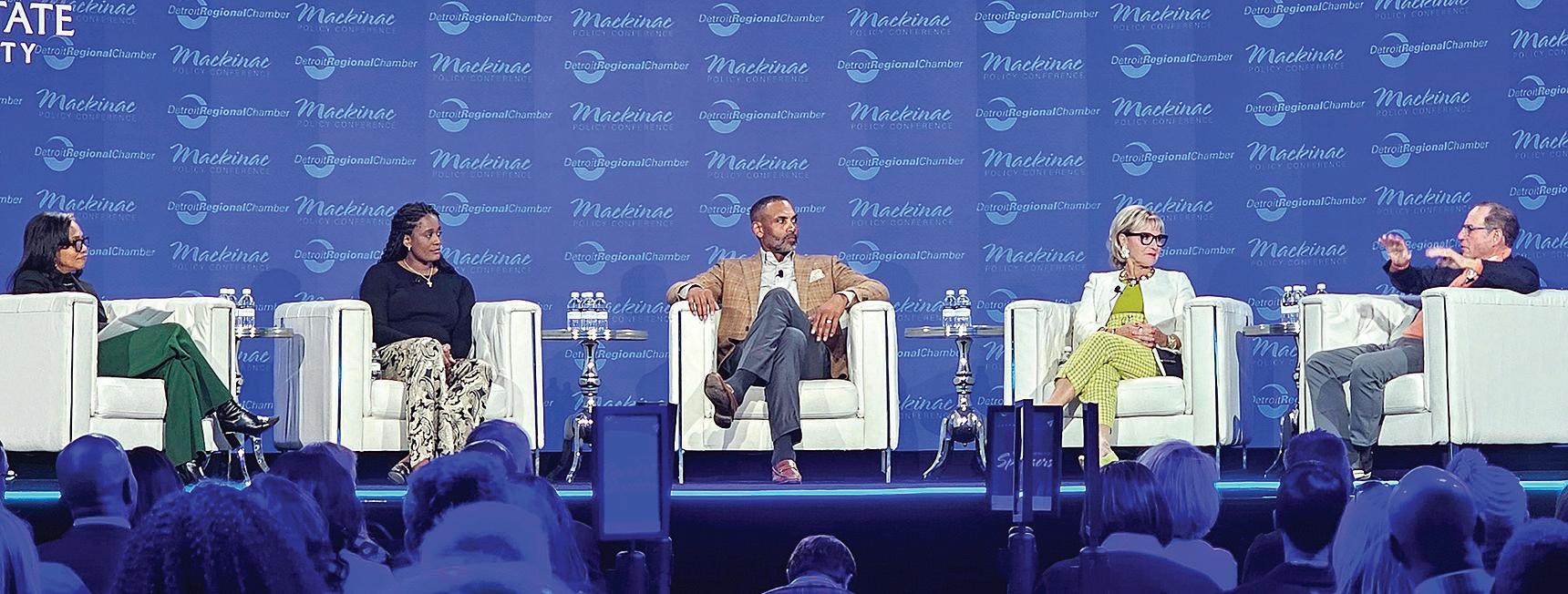
departure stung. Players, coaches, and fans pushed the league for years to bring a team back. Monday’s announcement marks the end of that wait and the beginning of a new era.
WNBA Commissioner Cathy Engelbert said Detroit’s history laid the foundation for its future. She praised Gores and the ownership group’s commitment to women’s sports and building opportunity for the next generation. The league itself is growing. The 2024 season saw the highest viewership in 24 years and the highest attendance in 22. Young stars like Caitlin Clark and Angel Reese are reshaping the cultural reach of the game. Corporate investments have grown, alongside merchandise sales and global fanbases.
The WNBA will expand with three new teams: Cleveland in 2028, Detroit in 2029, and Philadelphia in 2030. Two additional franchises, Portland and the Toronto Tempo, begin play in 2026.
A name for Detroit’s team has not been confirmed. However, the league filed a trademark for the Detroit Shock name in February, a strong signal that the team may reclaim its former identity.
Expansion means new jobs and investment in the city. Gores said Monday the move would bring community programming, youth sports initiatives, and fresh energy to Detroit’s sports scene. He called the return a win for Detroit, the WNBA, and girls dreaming of careers in professional sports.
The expansion process will in-

clude an expansion draft, allowing the new franchise to select players from existing rosters. In the most recent expansion draft, each team protected six players. The Golden State Valkyries built their team that way before entering the league in 2024. Detroit will follow that model.
The WNBA season runs from May through September, with playoffs through mid-October. Detroit’s franchise will start hiring leadership and front office staff ahead of the 2029 season.
Detroit has waited for this. Fans who once wore teal and red, who packed arenas to watch Cash, Nolan, and Ford dominate, have waited for the chance to stand up and cheer again. They carried those memories through more than a decade of empty promises, through doubts about whether the league would see Detroit as worthy of return.
That doubt ended Monday.
This new era will begin with a practice facility on the riverfront, a space the ownership group said will be built to support the team and serve as a hub for community outreach and youth programs. The franchise’s investor group said Monday they plan to build pathways for women into leadership roles, on and off the court.
The WNBA’s growth mirrors the larger push nationwide to lift women’s sports to the same stage as men’s leagues. Increased TV deals, sponsorships, and audience interest have pushed the WNBA into new territory. Detroit’s re-entry is part of that momentum.
Gores said Monday he felt a responsibility to use his position to support women’s sports in Detroit, praising the partners he assembled who reflect the city’s diversity and strength.
The former Shock set a high
bar. Three championships, conference titles, and a consistent run as one of the league’s top teams.
Former players and coaches often talk about Detroit as the most passionate basketball city they ever experienced. That legacy built the foundation for this new era.
As construction begins next year on the new practice facility, Detroit’s sports scene enters another chapter. This move is not about recreating the past. The next era focuses on growth, access, and building something that lasts beyond the scoreboard.
League officials said Detroit’s return brings credibility, history, and excitement at a time when the WNBA needs anchors in cities that embrace women’s sports.
Fans will have questions in the months ahead. What will the team be called? Who will coach? How will they build the roster? What colors will the franchise use? Those answers will come. For now, Detroit celebrates a promise kept, a legacy restored, and a chance to prove again why this city means so much to basketball.
The WNBA said Monday they would share more details on branding and community programming later this year. For the thousands of fans who filled seats at the Palace, who wore teal jerseys, who remember championship parades — this return is already a win.
Detroit has a history of bringing the noise when called. That history just got another chance to roar.




Detroit Michigan: Wayne County Community College District will host a site visit for continuing accreditation of its Associate of Applied Science Nursing Program by the Accreditation Commission for Education in Nursing (ACEN).
You are invited to meet with the site visit team and share comments about the program in person at a meeting scheduled at 3:00 p.m. on Tuesday, September 16, 2025, at the 8200 West Outer Drive, Detroit, Michigan 48219. Written comments are also welcome and should be submitted to the ACEN via email at public-comments@acenursing.org or to the ACEN office:
Attn: Accreditation Services Accreditation Commission for Education in Nursing 3390 Peachtree Rd NE, Suite 1400 Atlanta, GA 30326
The ACEN should receive all written comments by August 26, 2025 For information, contact Unbreen Amir at uamir1@wcccd.edu
By Sam Robinson SENIOR REPORTER
Local lawmakers joined Asian American leaders on Cass and Peterboro Monday to unveil a street sign above Peterboro Street honoring the late Vincent Chin.
Chin was a 27-year-old Chinese American who was beaten to death in 1982. He was killed by auto workers who blamed Chin for industry layoffs, in what advocates say was a racially motivated hate crime.
His death sparked an Asian American civil rights movement in Detroit.
“What happened to him on June 19, 1982 was definitely tragic and just such an awful occurrence… He was beaten four times with a baseball bat. His last words were ‘It’s not fair,’” said Roland Hwang, 75, an attorney who helped create American Citizens for Justice after Chin’s death.
The group met for the first time to discuss Chin’s murder in 1982. Two years ago, Hwang and other Asian American activists like Richard Mui tried to convince the city to halt the demolition of the 140-year-old Chinese Merchants Association building at 3143 Cass Ave. Olympia Development razed the structure in July 2023.
Lawmakers, including State Sen. Stephanie Chang, council member Gabriela-Santiago-Romero, who represents Chinatown within District 6, and Mayor Mike Duggan, spoke on stage underneath a tent set up on Peterboro outside of Craig’s Coffee and the Peterboro restaurant.
Chang spoke about the importance of educating future generations about Chin’s life, which prompted a broader fight for justice. She said she was excited for visitors to pass by the sign and ask, “Who was Vincent Chin?”
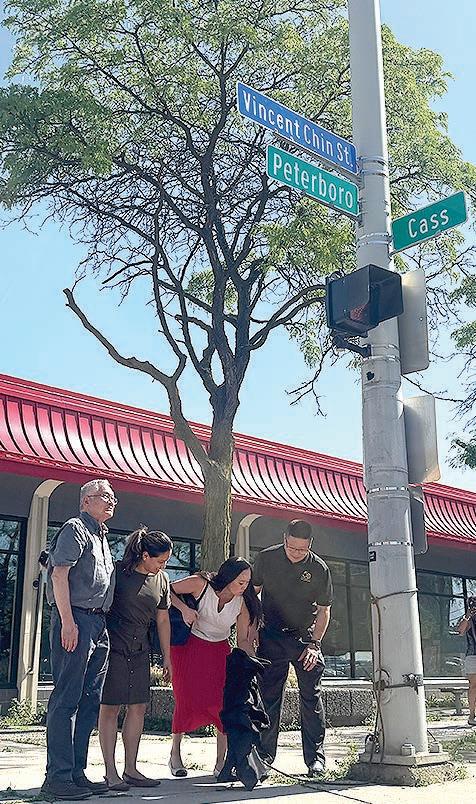
“During these increasingly challenging times where the Trump administration is using fear mongering and unlawful scare tactics to create division in our communities,” Santiago-Romero said. “Too many communities, including our Asian American community are continuing to experience violence and harassment.”
An emcee noted that getting Chin’s name on the sign required the City Council to approve a change to its symbolic street name ordinance, which prevented non-residents from having their names above street signs. Chin lived in Highland Park before his death.
Rev. Horace Sheffield III of the Detroit Association of Black Organizations told the crowd his father called him in tears after he heard the news of Chin’s murder. His father, Horace Sheffield Jr., was an influential UAW leader who helped Black and other minority members attain leadership positions within the union.
He highlighted Hwang’s commitment to supporting causes involving his Black neighbors.
“I’m just proud, even though we had the Detroit Association of Black Organizations, that my friend Roland understood that injustice anywhere was a threat to justice everywhere,” Sheffield said.
Duggan said on stage he was angry and frustrated after hearing about Chin’s death and the lack of charges from Bill Cahalan, the county prosecutor at the time. Cahalan resigned a year after deciding to give Chin’s killers probation due to public outcry. Duggan was a law student at UofM in 1982 and said Chin’s murder.
“A new prosecutor, John O’Harris was elected in 1984, and one of his first hires was a young graduate of University of Michigan law school — it was me,” Duggan said. “He would tell me how tormented he felt that the Wayne County prosecutor’s office had been part of such a miscarriage of justice.”
The audience was made up of mostly stakeholders from organizations involved in the revival of the block, which at one time was the city’s second Chinatown, with restaurants and a recently demolished community center, which also served as a free health clinic.
Today, residents of the area are mostly transplants living in apartment buildings off Woodward on Charlotte and Peterboro. There are two longtime homeowners in the area who live next to the Detroit Shipping Co. restaurant, but neither were in attendance.
They can expect to see a more active block in the coming months.
Midtown Inc. last year received $1 million in state funds for streetscape improvements on Peterboro and Cass. Details for the upgrades or when they are set to take place have not yet been made public.
Separately, a developer who transformed the long-abandoned Chung’s restaurant is still seeking users to populate the renovated space on Cass and Peterboro.
The Detroit Chinatown Vision Committee, led by local archivist Francis Grunow, is hosting the first-ever Chinatown block party on July 26.

By Reasla Teague
This story first appeared in the Houston Defender, part of the Word In Black network.
When Beyoncé releases new music, the world pays attention. But with Cowboy Carter, the Houston-born superstar isn’t just dropping hits—she’s sparking a movement.
From the music charts to fashion runways, and now to local economies, Cowboy Carter is redefining what it means to be a Black creative in Western culture. And for those of us in Houston—her hometown—this moment feels especially personal.
Rewriting the Story of the West
For generations, Black cowboys and cowgirls have been erased from the dominant narrative of American Western history. But Beyoncé, with her signature blend of artistry and activism, is changing that.
Through the Cowboy Carter album and her world tour, she’s centering Black country artists, celebrating Western style, and pushing back on a genre that hasn’t always embraced artists who look like her. Collaborations with rising stars like Tanner
Adell and Brittney Spencer aren’t just features—they’re statements of solidarity and reclamation.
Her message is clear: Black people have always been part of the country music story. Now, that truth is being told on the biggest stages in the world.
A Boost for Black-Owned Brands
The impact of Cowboy Carter isn’t limited to music. Beyoncé has ignited what some are calling the “Cowboy Carter economy.”
Searches for cowboy boots, fringe jackets, and Western hats have skyrocketed since the tour began, and many of those dollars are flowing toward Black-owned businesses. In cities like Chicago and London, local entrepreneurs report a noticeable bump in sales tied directly to concert traffic and the Beyoncé aesthetic.
From custom rhinestone hats to handcrafted leather goods, Black designers are cashing in—and carving out space in a market that has rarely prioritized them.
Houston’s Legacy, Reclaimed
The incumbent council member and her challenger spoke to District 6 voters Thursday evening at a candidate forum at the Hispanic Development Corporation on Trumbull.
The race in District 6 features incumbent Councilwoman Gabriela Santiago-Romero and state Rep. Tyrone Carter, D-Detroit. Write-in candidate Anita Martin, a community activist, also participated in Thursday’s forum hosted by BridgeDetroit.
Carter brings thirty years of legislative experience to the race, Santiago-Romero is decades younger and represents Southwest Detroit as the lone Hispanic member of Detroit City Council.
While the state lawmakers and incumbent city council members mostly agree on issues like environmental racism and supporting ordinances that make it harder for immigration enforcement to deport noncitizens, their answers on corporate influence underscore the difference in their political philosophies.
Throughout his career, Carter has accepted money from companies like DTE and Consumers Energy, Comerica Bank, and Marathon Petroleum. Santiago-Romero has refused money from corporate PACS and has made it a sticking point of her campaign.
Carter said it’s insulting when voters insinuate politicians who take corporate money owe them something in return.
“Who you accept money from means you’re bought and paid for — it’s an insult to almost anybody running,” Carter said. “The biggest contributor to any campaign that I’ve ever had was me... How do you represent the poorest district? You’re not rich. Where do you get the money from? I love this stuff about, ‘I’m not taking corporate money.’ I’m in Lansing, yes, I’ve taken money from DTE, but I call DTE every week and say, ‘What’s the update?’” It’s not about someone taking money and a quid-pro-quo. At the end of the day, I don’t need this job to pay my bills. My job is to make sure the people I represent get what
Beyoncé is honoring that legacy in a way no mainstream artist has done before. She’s not just performing in fringe and denim—she’s reminding us of who we’ve always been.
For young Black creatives in Houston, this moment is a blueprint: embrace your roots, amplify your voice, and don’t wait for permission to take up space. What Comes Next?
As Cowboy Carter continues to dominate charts and headlines, the question becomes: how do we build on this momentum?
How do we support Black-owned Western fashion brands long after the tour ends?
Can we create infrastructure— grants, mentorships, workshops— that ensures this cultural wave becomes lasting change?
And how can Houston lead the charge in preserving and celebrating our own cowboy history?
Beyoncé has once again given us more than music—she’s given us a platform. Now it’s up to us to stand on it.
Here in Houston, the movement hits home. Our city is steeped in Western heritage, and Black cowboys have long been part of that legacy—from the rodeos in the Third Ward to the trail rides that stretch across Texas.
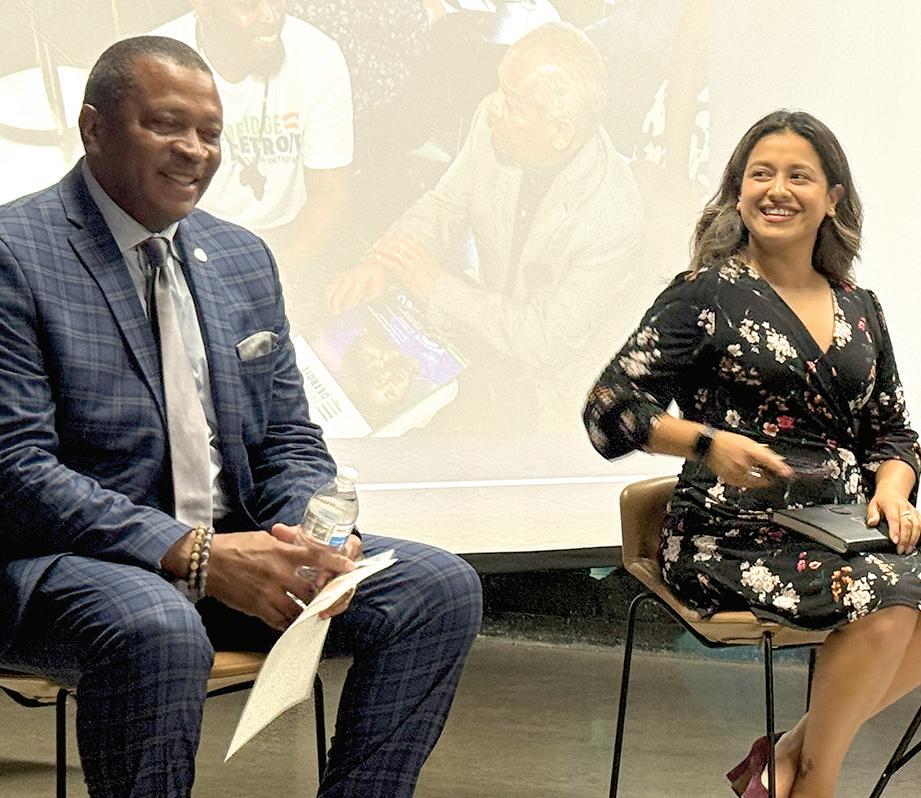
they need.”
Carter said when he raised more than $200,000 last year as the chair of the regulatory reform committee, it went to some colleagues who said they don’t take corporate money.
“I won’t be taking corporate PAC money because I believe you should be accountable to the people,” Santiago-Romero said. “People do have money, there are rich people with money in District 6 — we cover Corktown, downtown, Midtown, Woodbridge, with very wealthy people who are able to donate. I also get donations from across the state and across the country because my vision and passion to serve goes beyond this city. I have already been offered PAC money that I will not take and will not accept, because I can continue working with Rocket Mortgage without taking their money. I already work with DTE, meet with them consistently without taking their money.”
Santiago-Romero said politicians don’t need to take money from corpo-
rations to have a working relationship with them. She said she agrees with Carter that fundraising is incredibly difficult but said it takes hard work.
“I ask people over and over and over again, can you please give me five? Can you please give me $20? Do you know someone who can give me $100? Can you please max out because I know you own a business and you’ve got the money... I just do not agree with taking PAC money.”
Santiago-Romero assumed office in Jan. 2022. Her current term ends Jan. 1, 2026.
Carter ran for the seat in 2017 and lost to incumbent Raquel Castaneda-Lopez by 400 votes.
While the public will have a clearer picture of both candidates’ coffers after a July campaign finance reporting period, Santiago-Romero’s latest campaign filing report shows $13,381. Carter’s most recent report for his active state campaign committee shows $37,733.
Bidnet Direct www.bidnetdirect.com//detroit-transportation-corporation Christopher Thomas Chris Thomas Procurement Specialist cthomas@thepeoplemover.com
The Suburban Mobility Authority for Regional Transportation (SMART) is soliciting RFQs for Pre-Employment, Drug, and Alcohol Screenings Control No. 23-3659. RFQ forms may be obtained beginning October 19, 2022, from http://www.mitn.info. RFQs are due by 3:00 PM ET, November 11, 2022



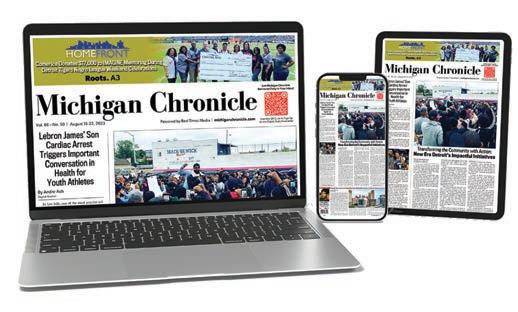


Zias, lifestyle, beauty and fashion expert and mom. “I love any excuse to bring people together and – let’s be real – I’m always looking for a reason to throw a party. The key is keeping things low stress for the host and making sure guests feel comfortable the second they walk in.”
This season, Zias and Glade are teaming up to share some of her favorite summer entertaining tips, which are simple, low-effort ways to make every gathering feel special. Whether you’re planning a full-blown backyard bash or hosting a few friends for drinks, Zias’ go-to ideas are all about setting the mood and enjoying the moment.
1. Set the Scene Without the Stress
To achieve a beautiful scene and make cleanup a breeze, try using disposable plates, utensils, napkins and cups in red, white and blue. A self-serve drink station with strawberry-infused water and a table of colorful fruit skewers adds charm without requiring much prep.
2. Tap Into Nostalgia Through Scent Scent can instantly transport guests back to cherished summer memories, making it a powerful way to set the tone and spark conversation. Zias suggests using home fragrances to do just that. The new Glade Americana collection, available exclusively in stores and online at Walmart, features three limited-edition scents inspired by nostalgic summer traditions like beach trips, ice pops and garden-fresh fruit. Masterfully crafted to help bring summer to every room of your home, they’re designed to evoke warm-weather traditions.
■ Berries & Cream: Scents of a classic American summer treat spring to life in a picnic-perfect blend of apple, red berries, apricot, vanilla and sweet

